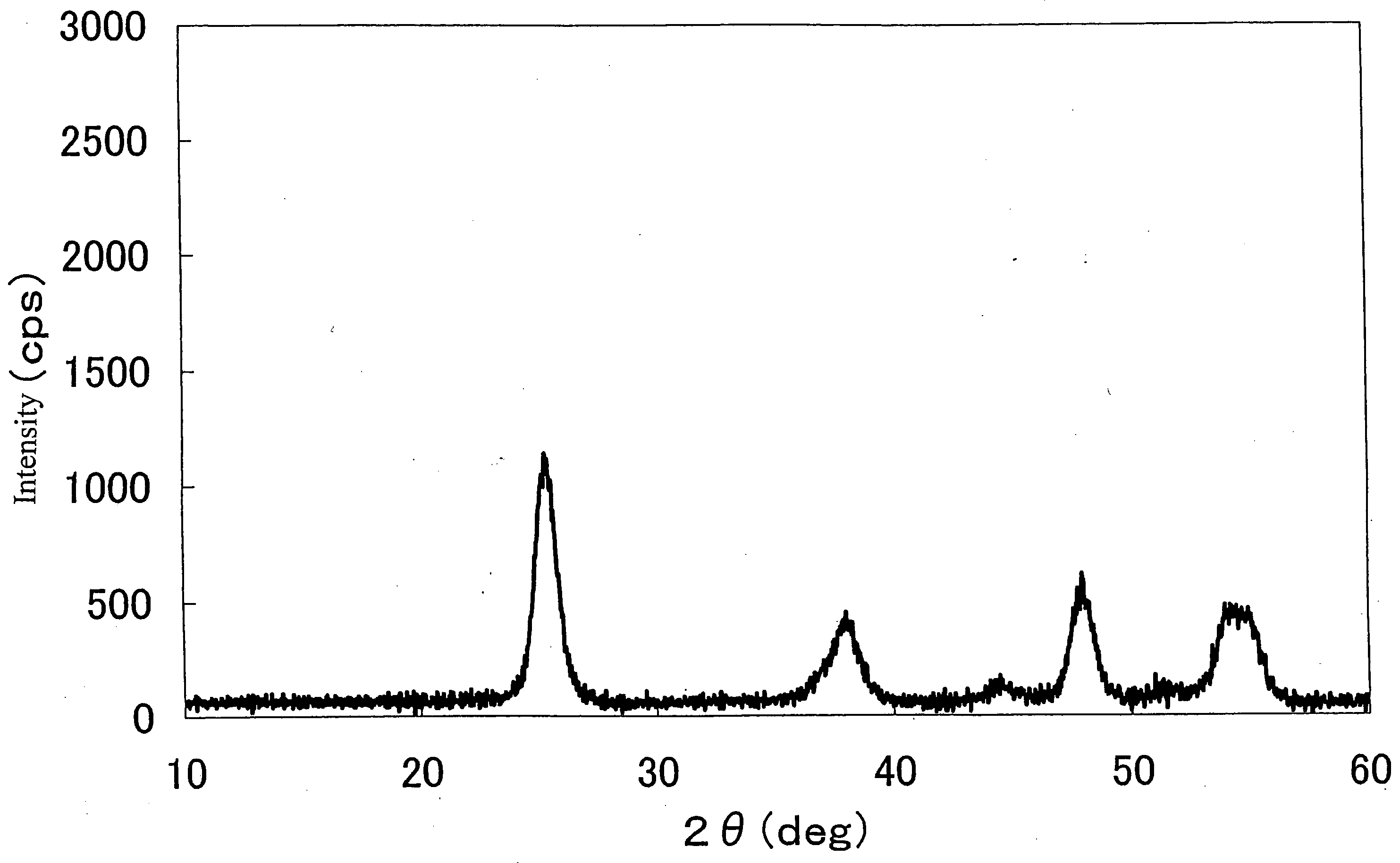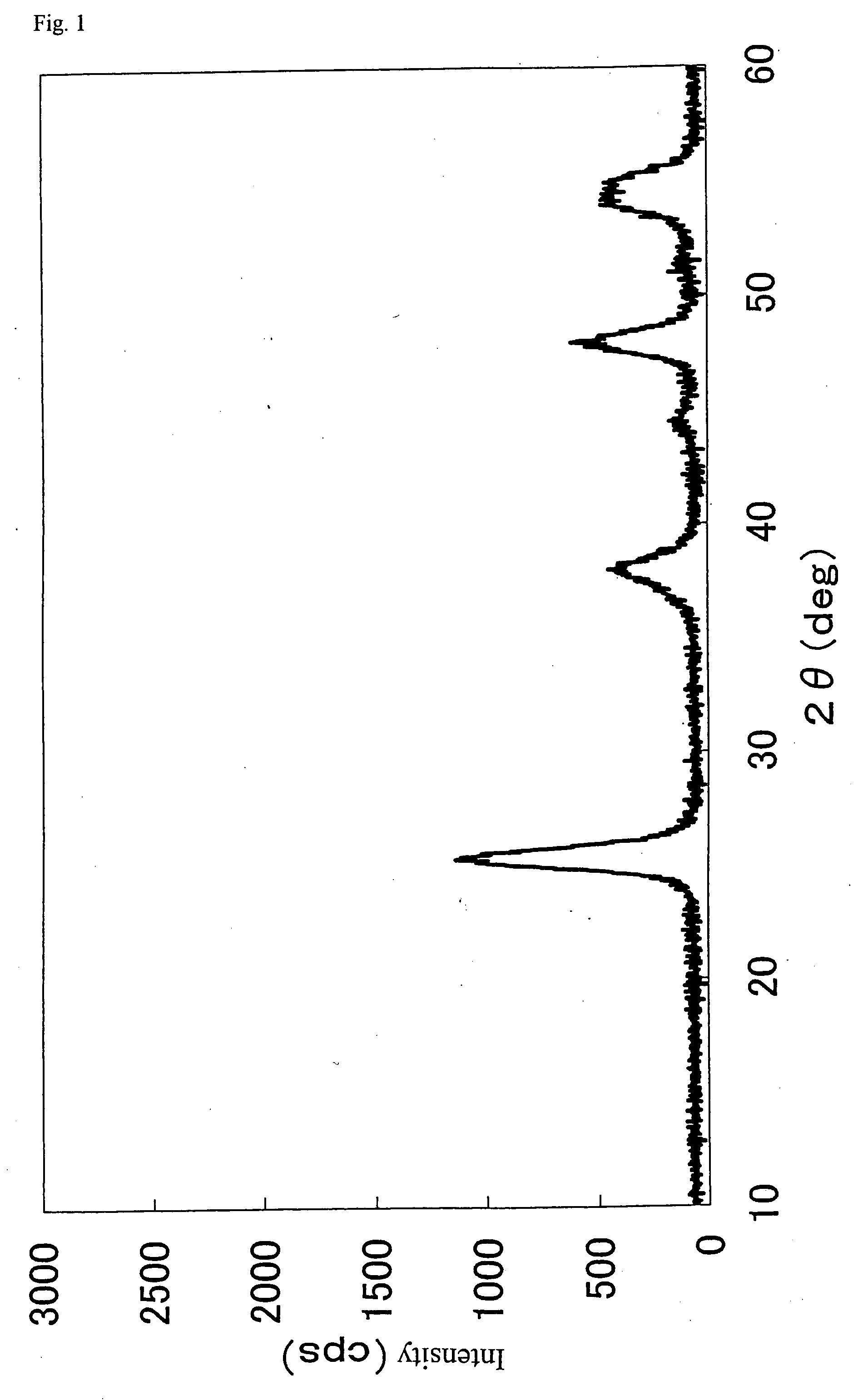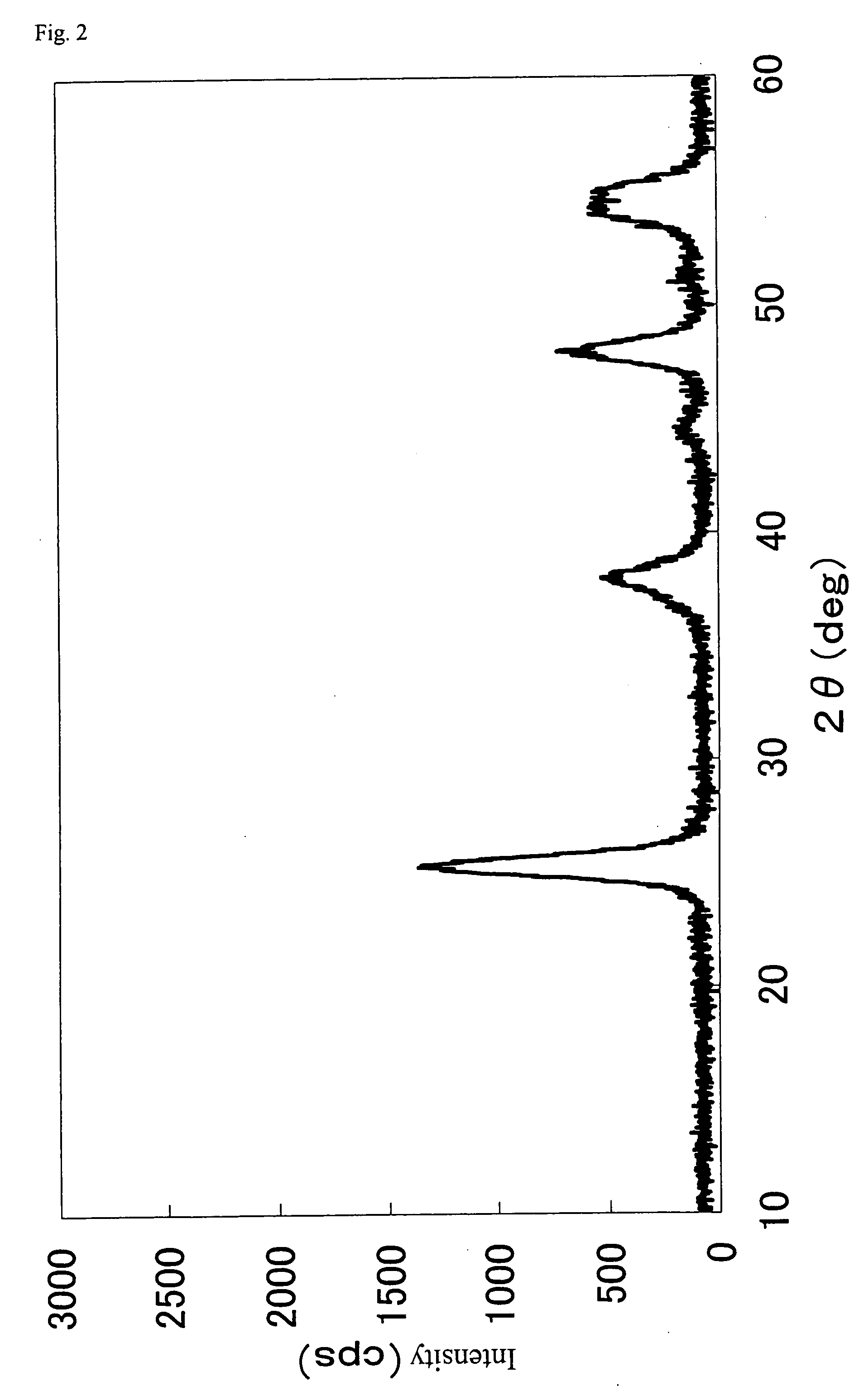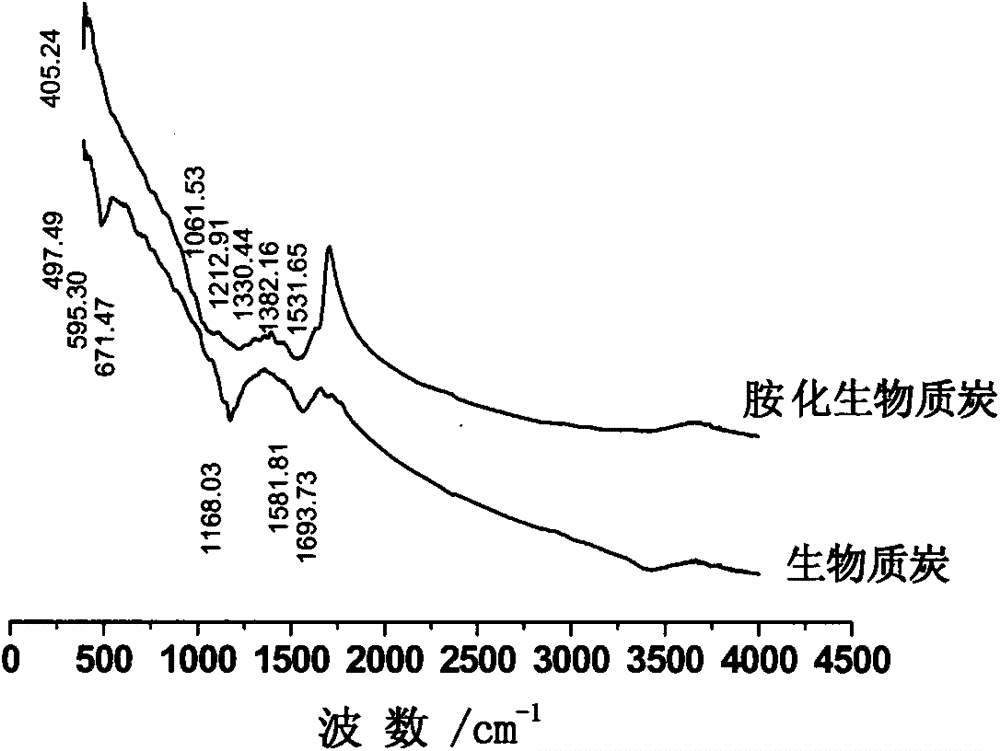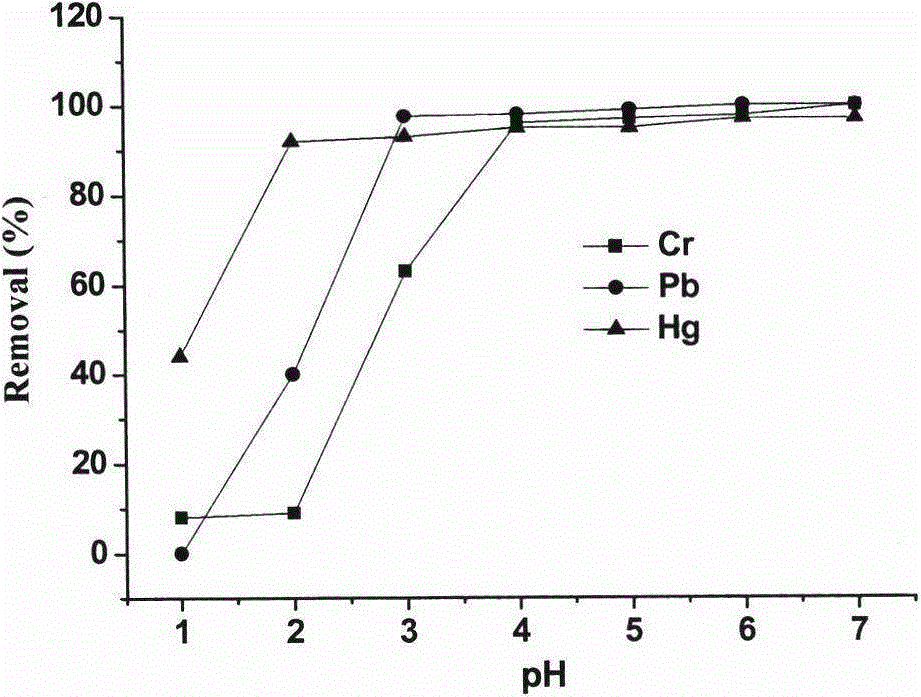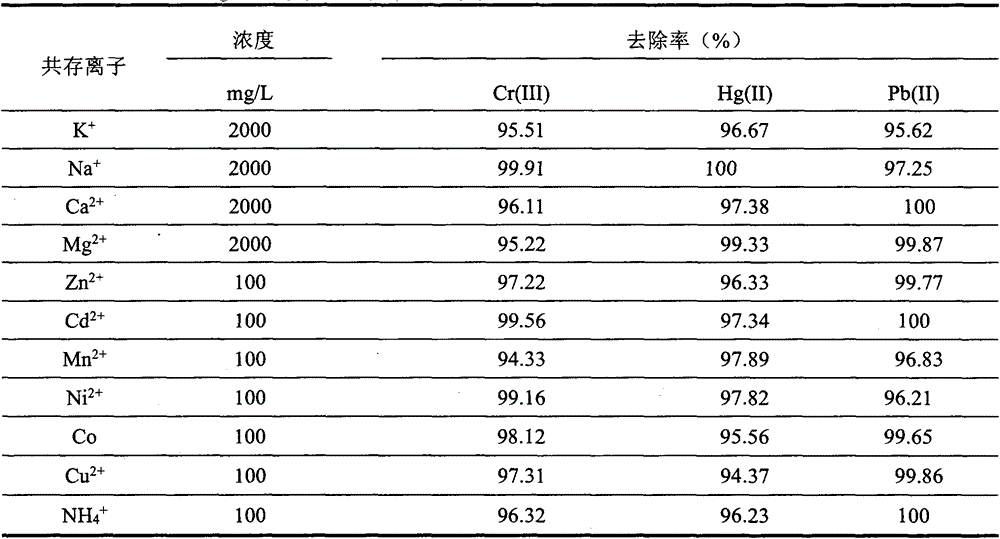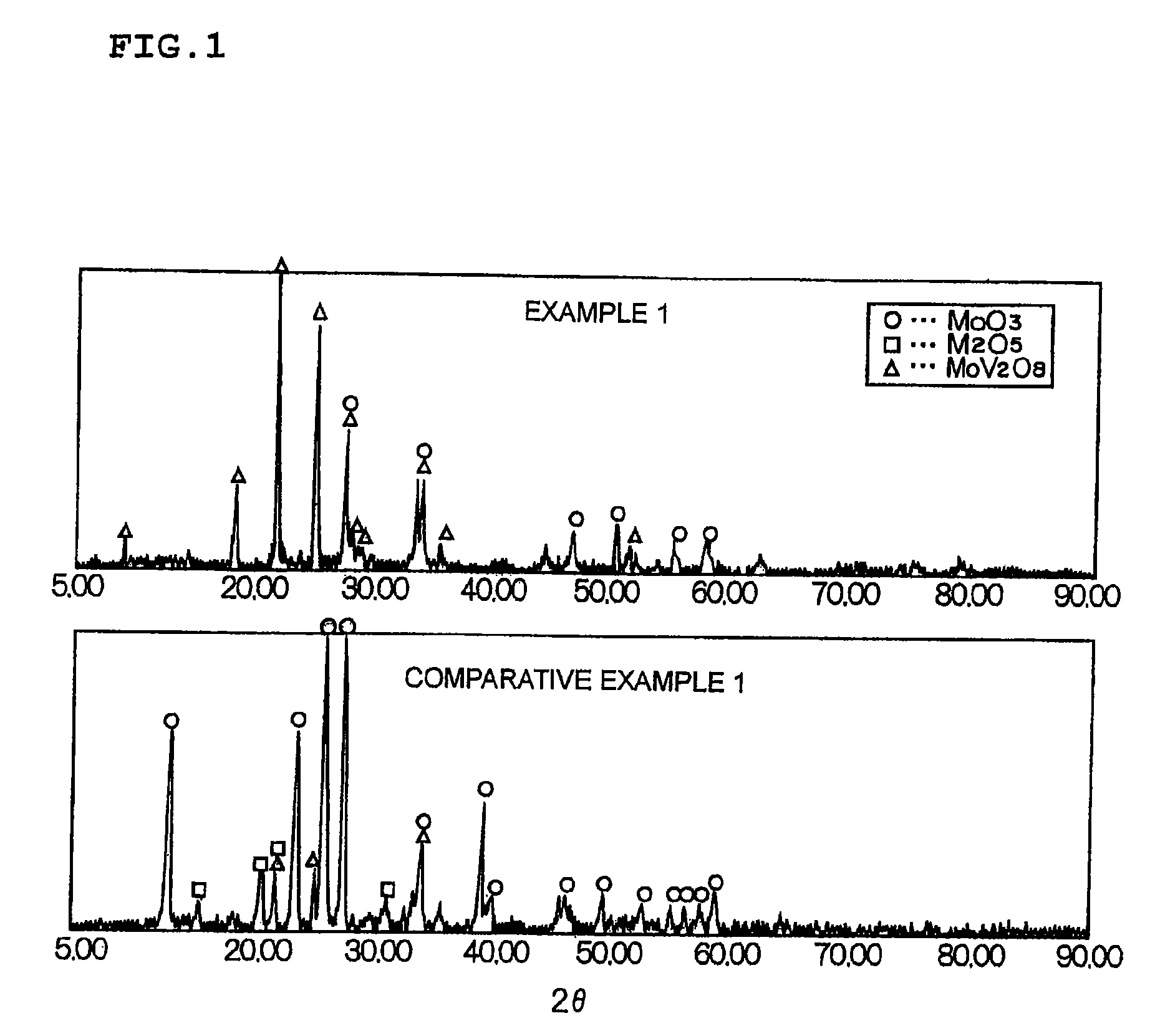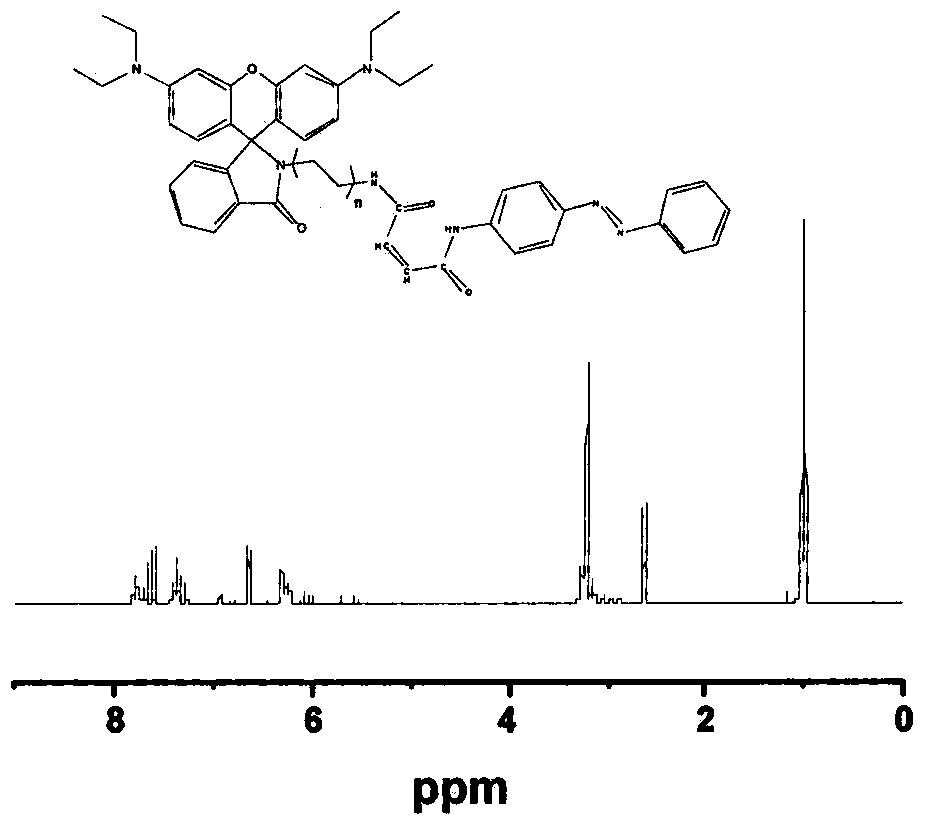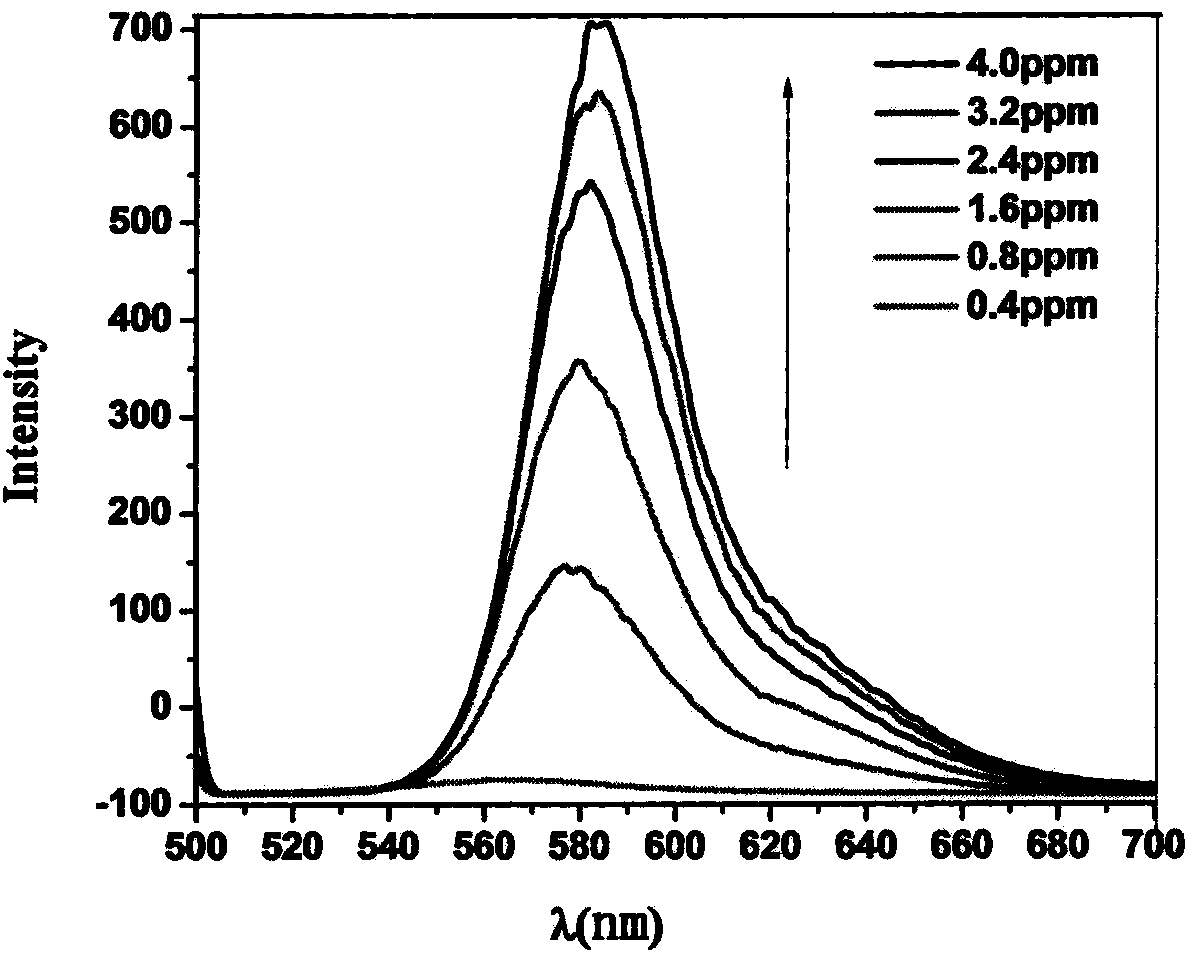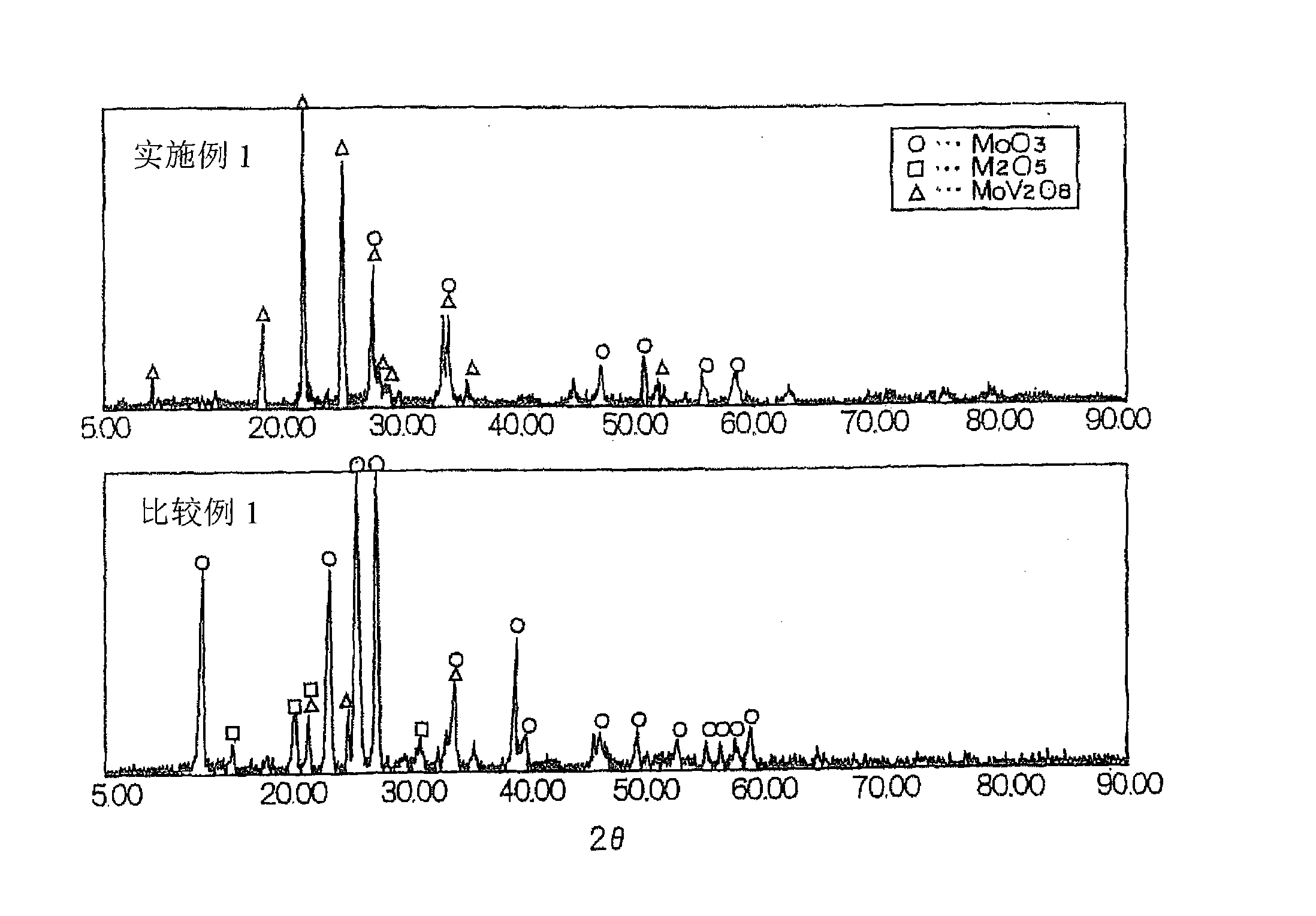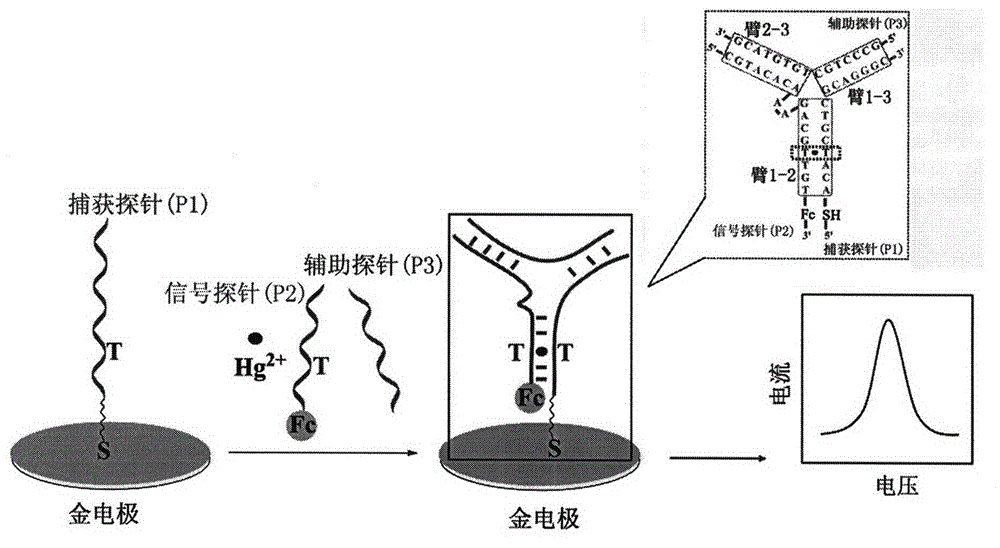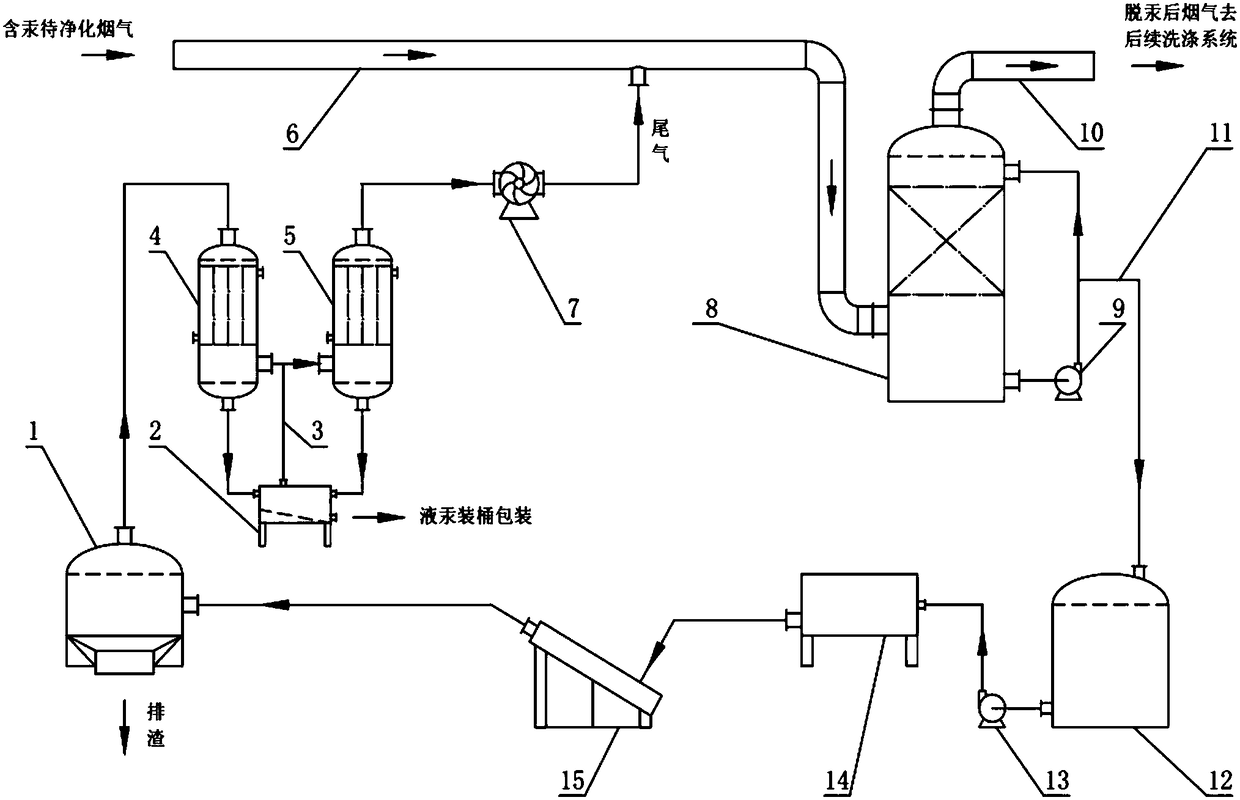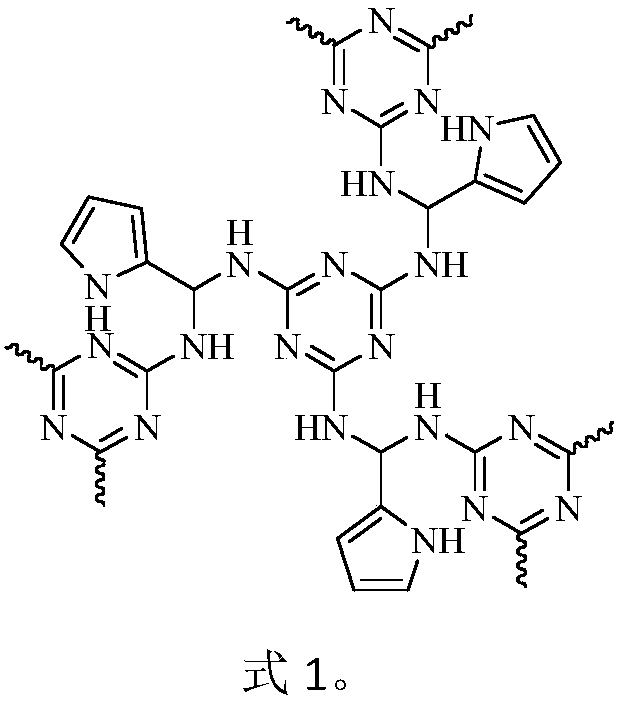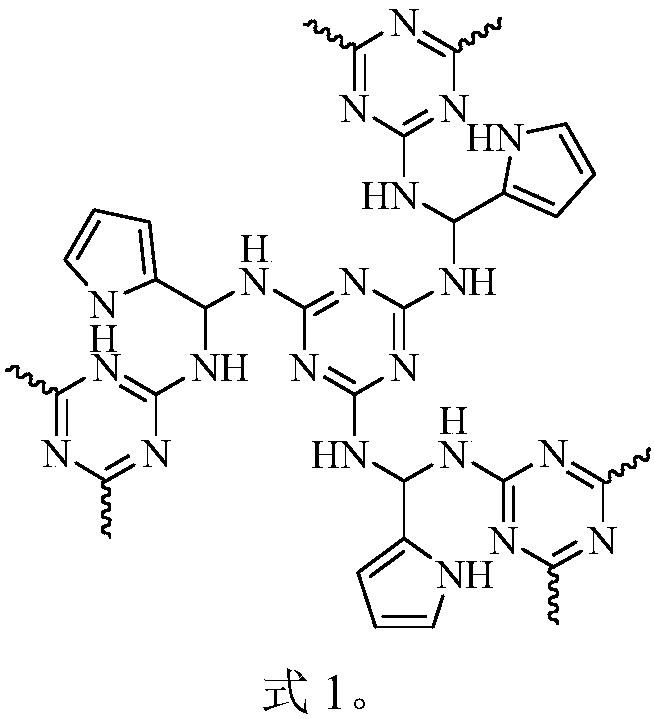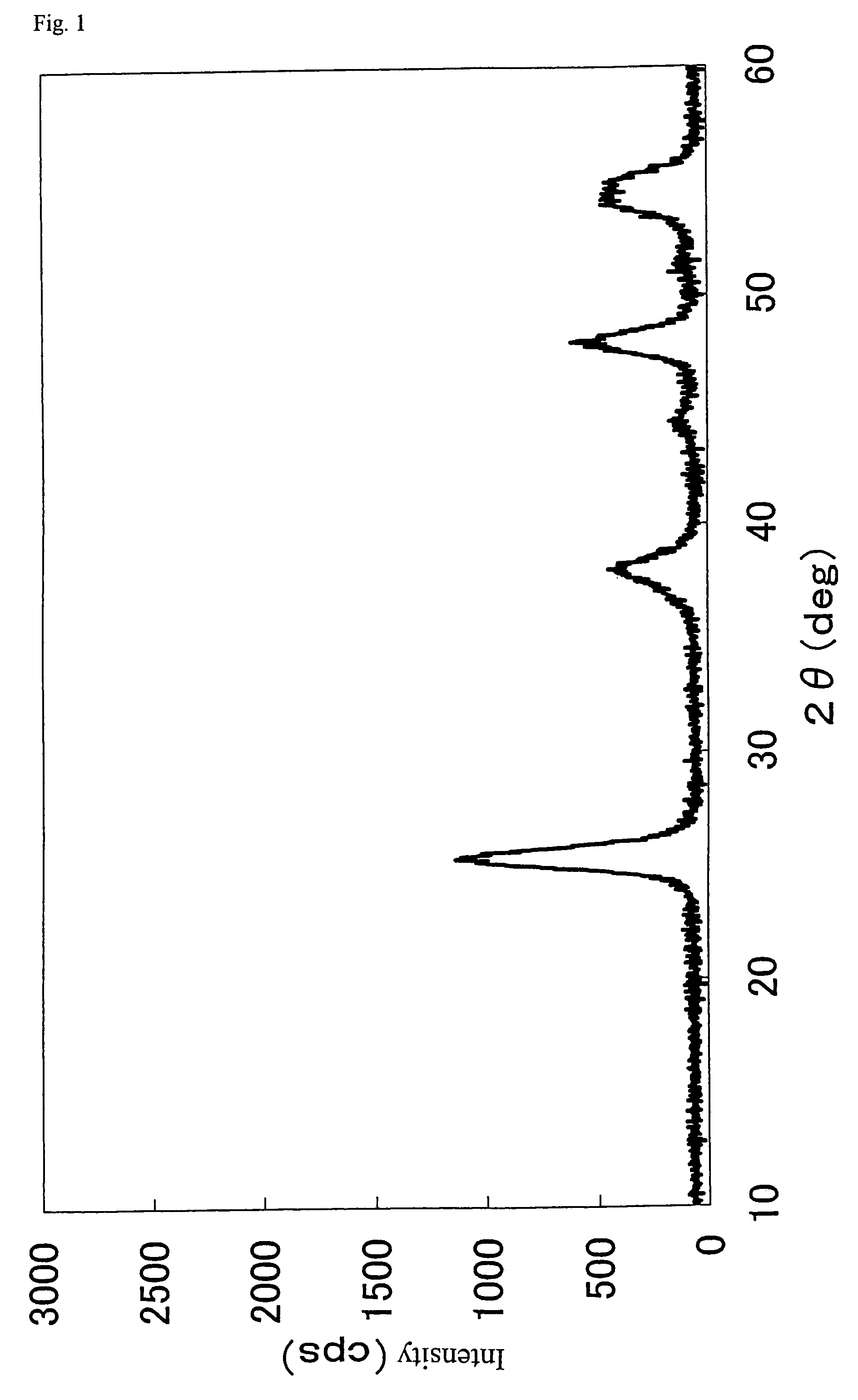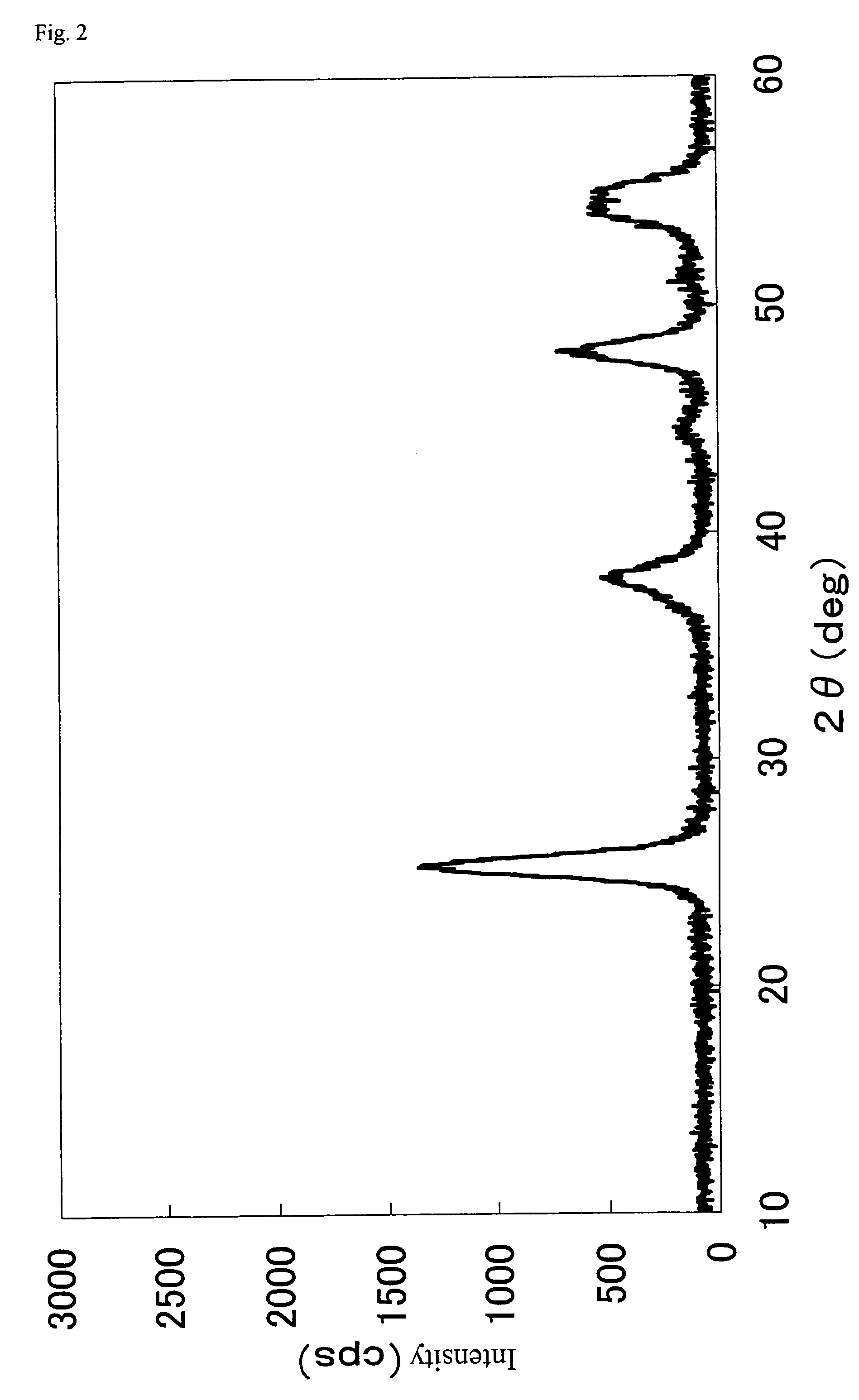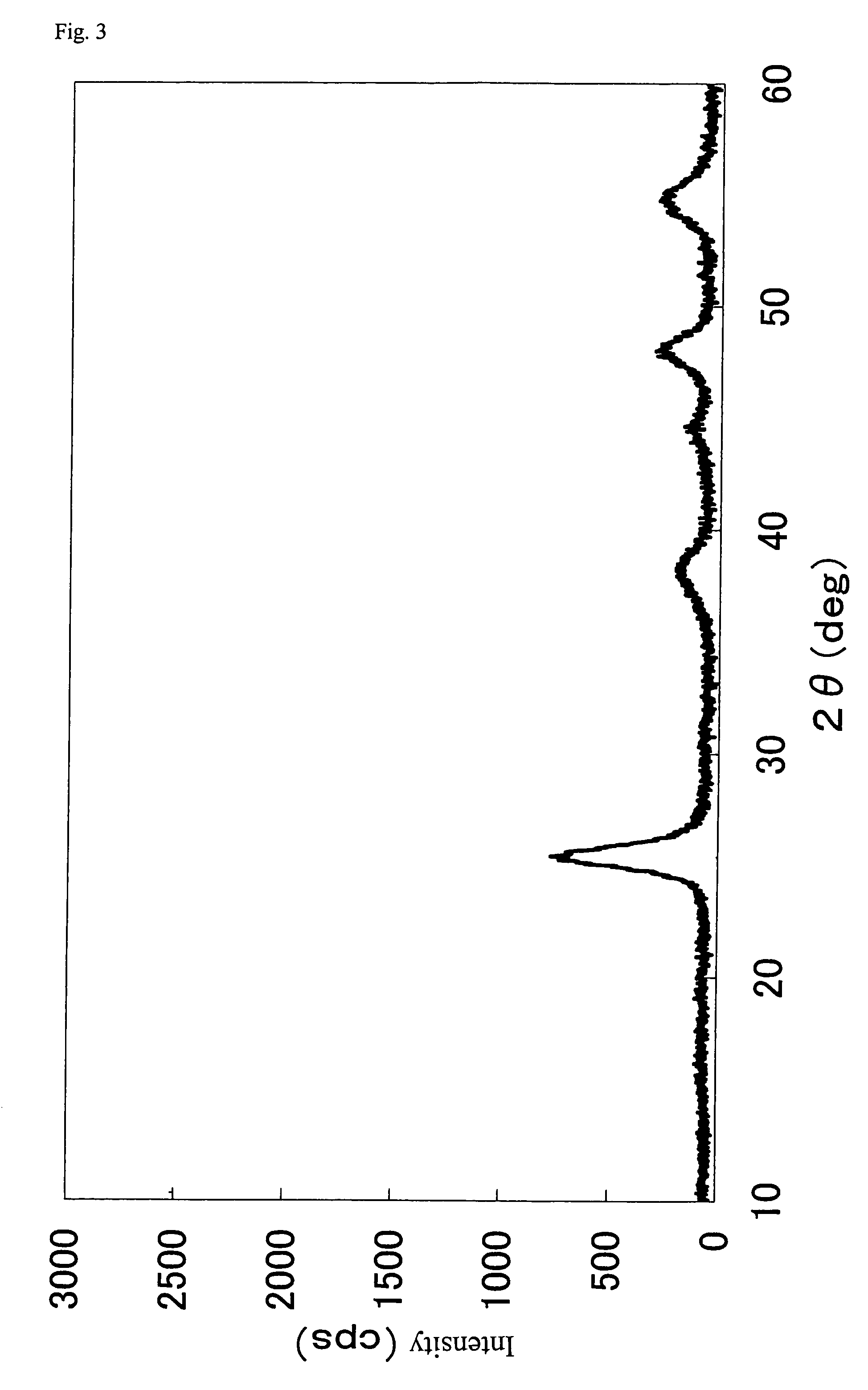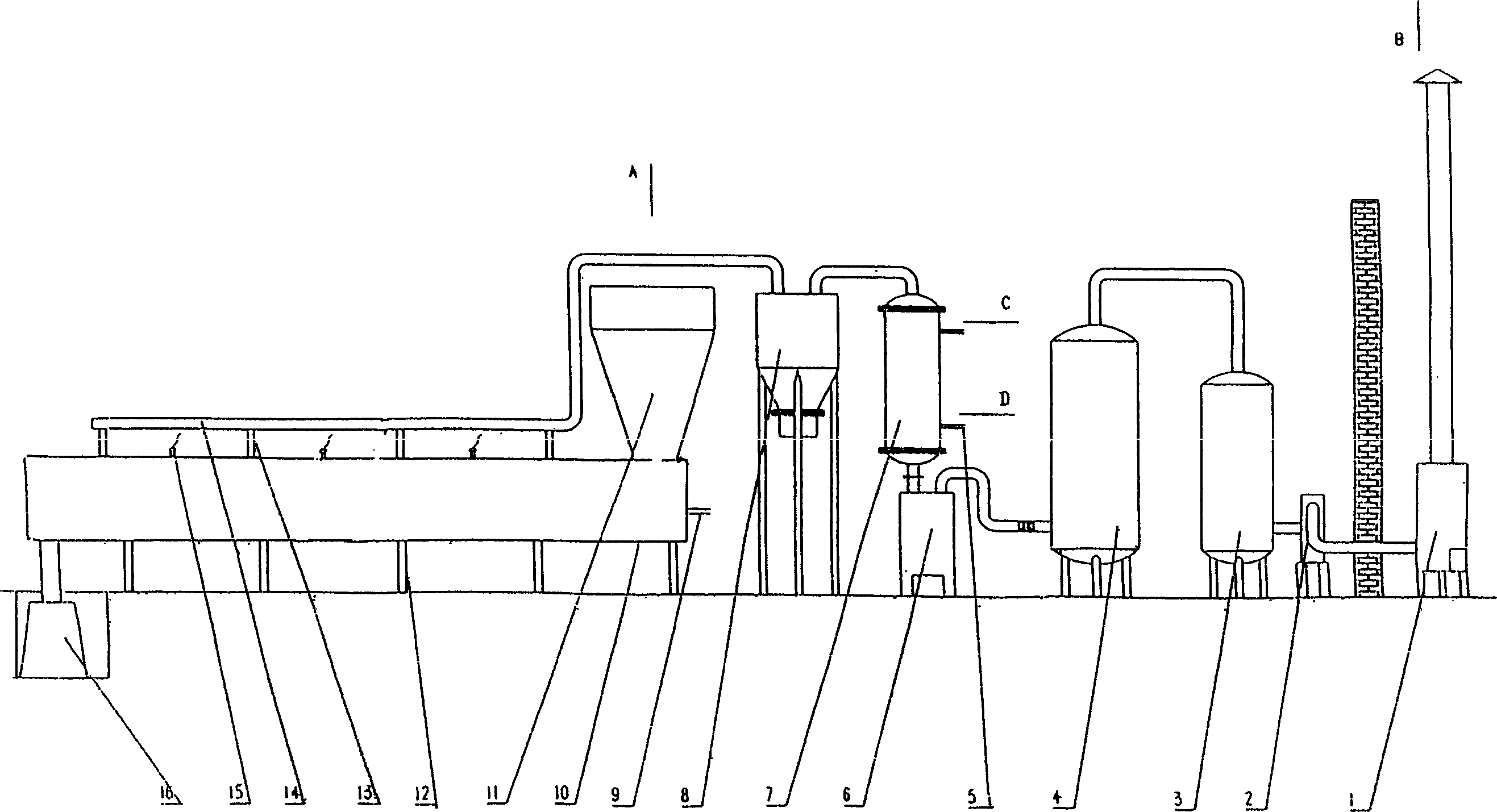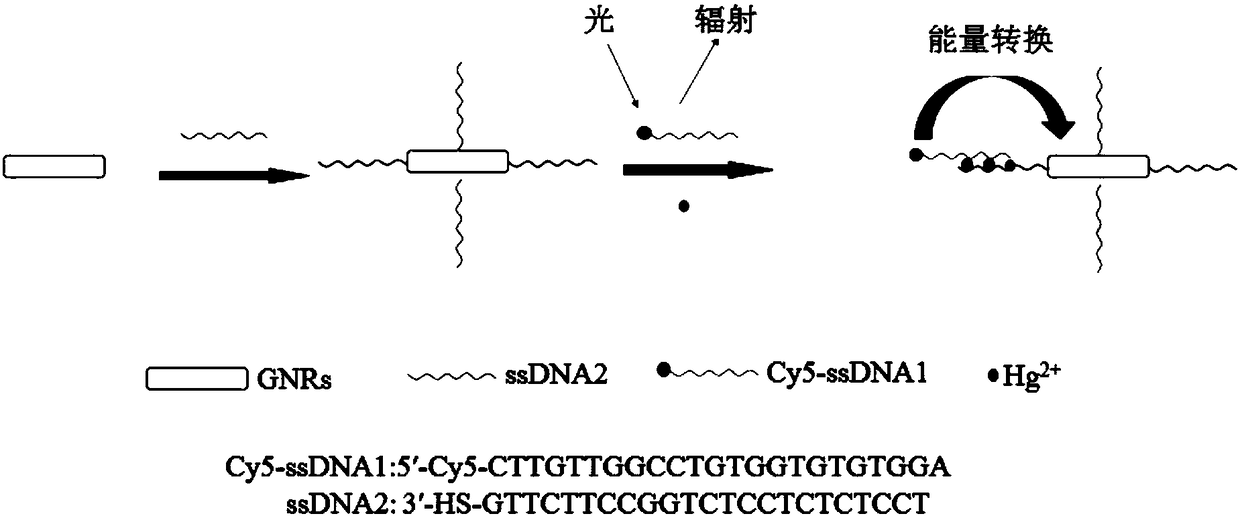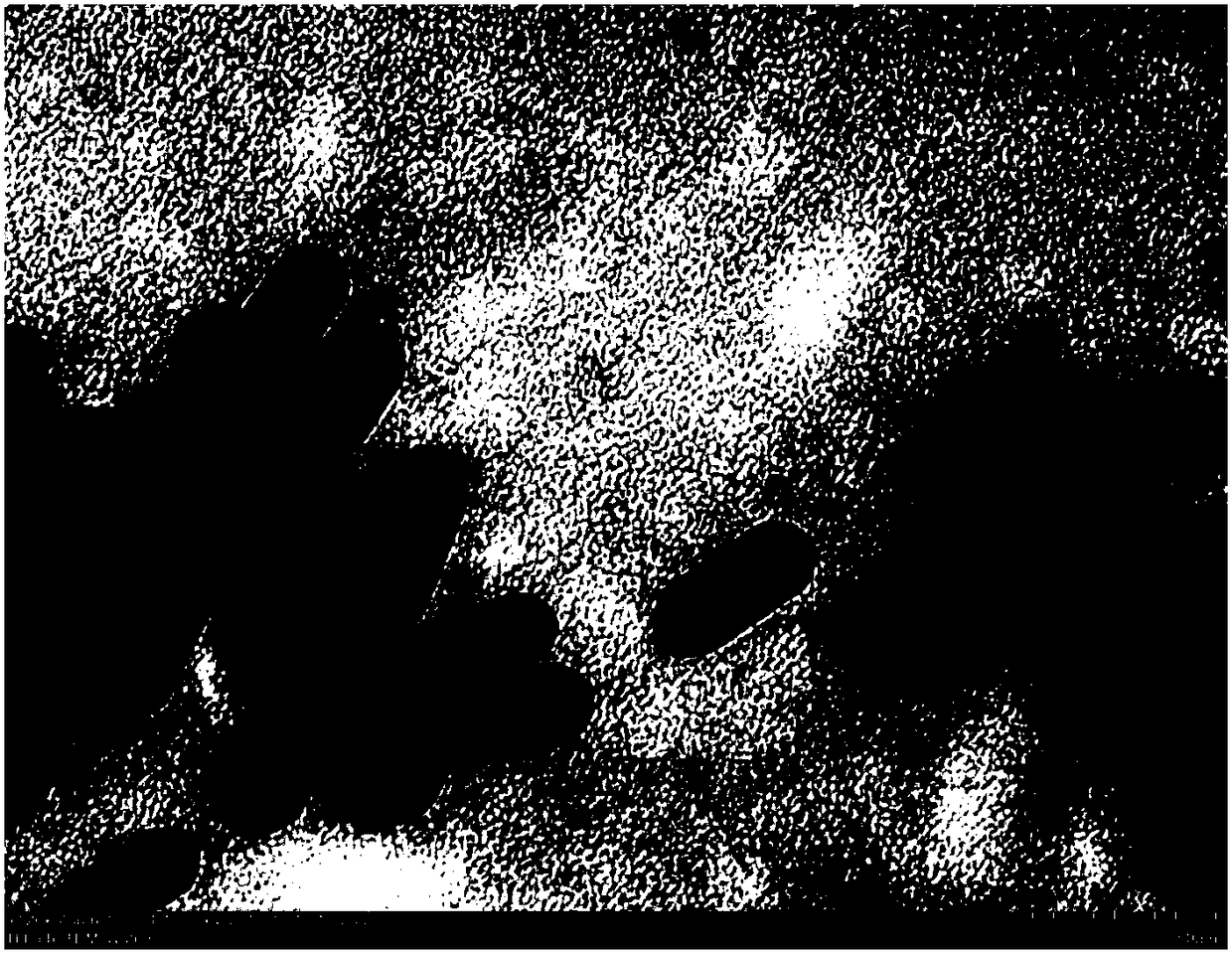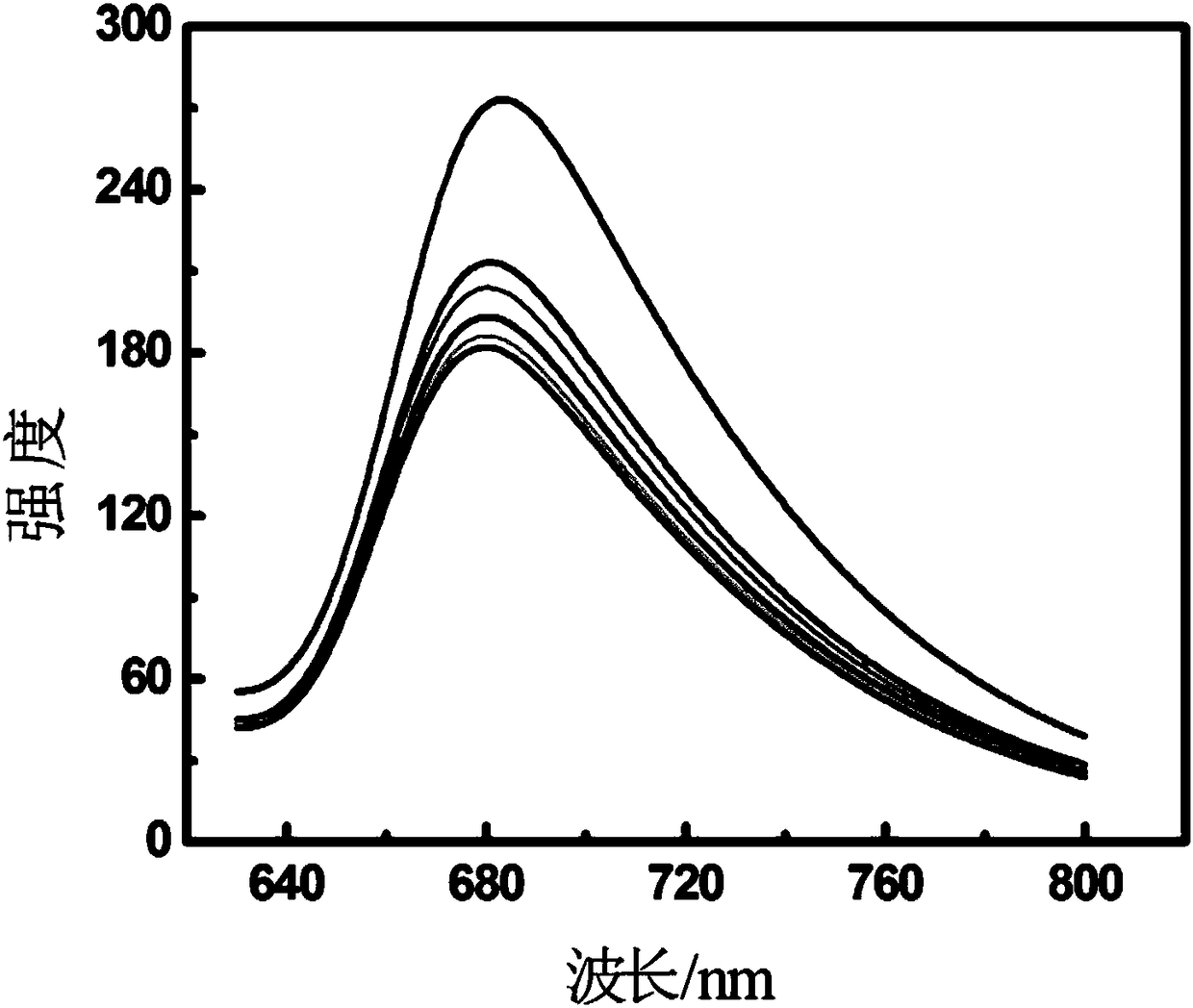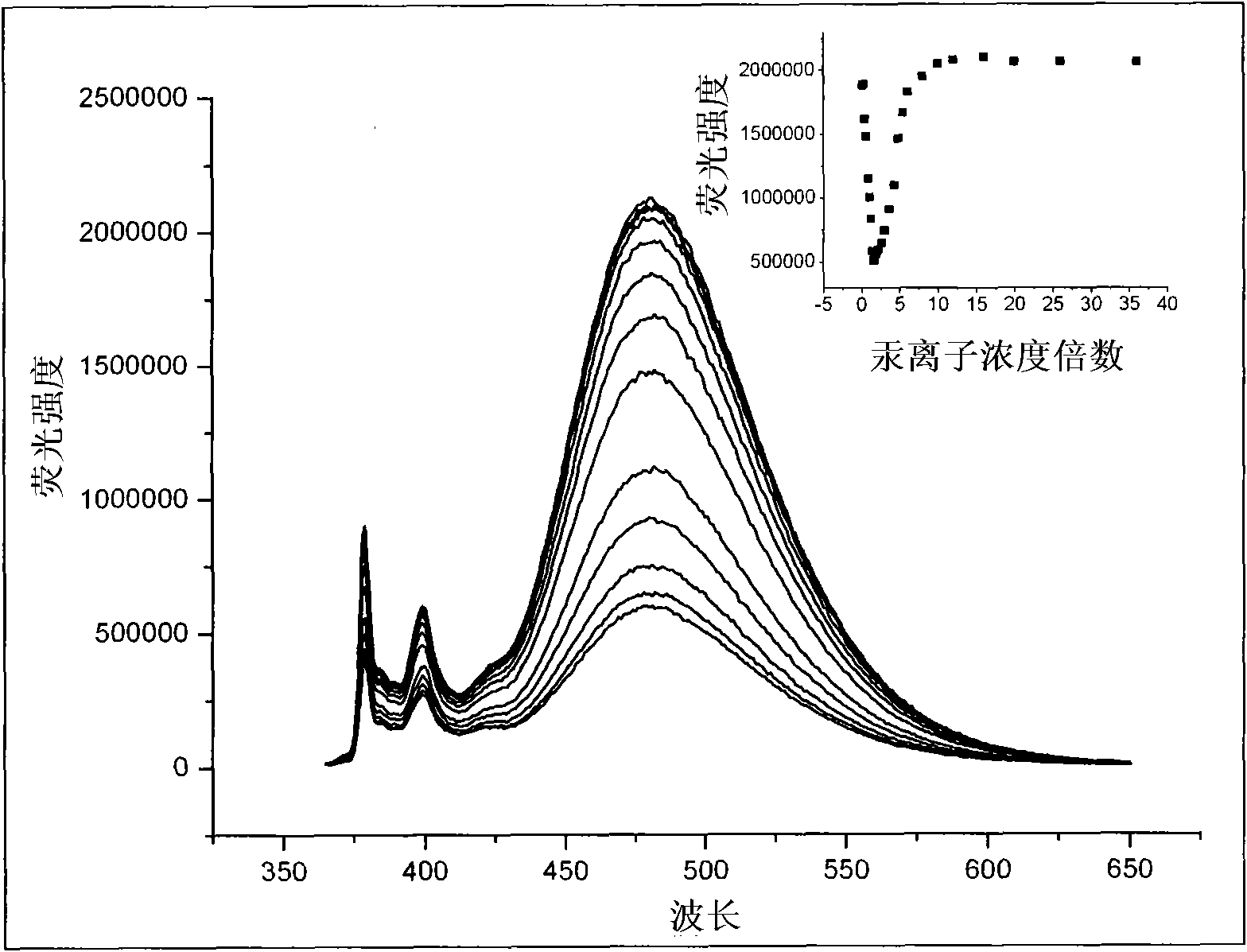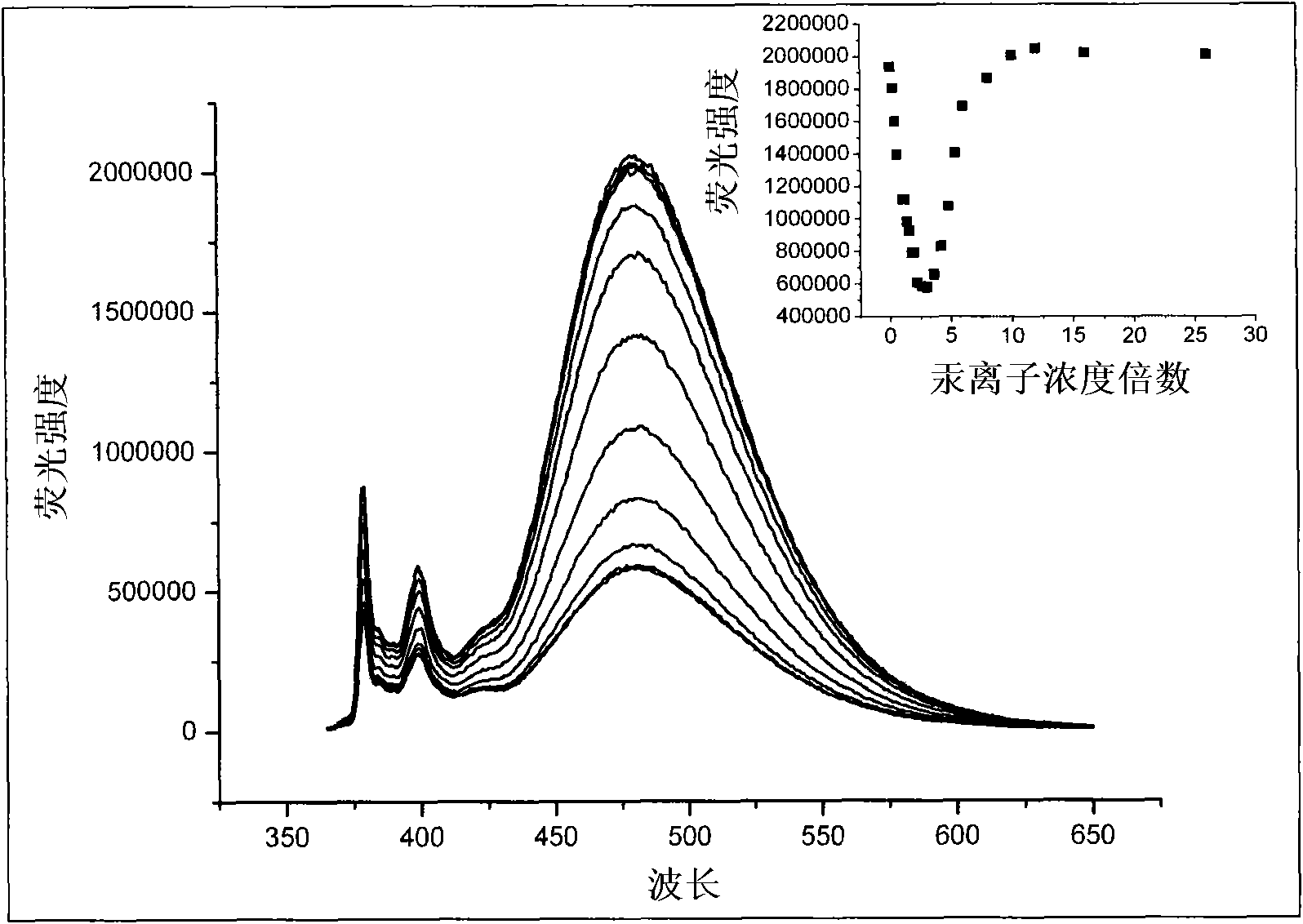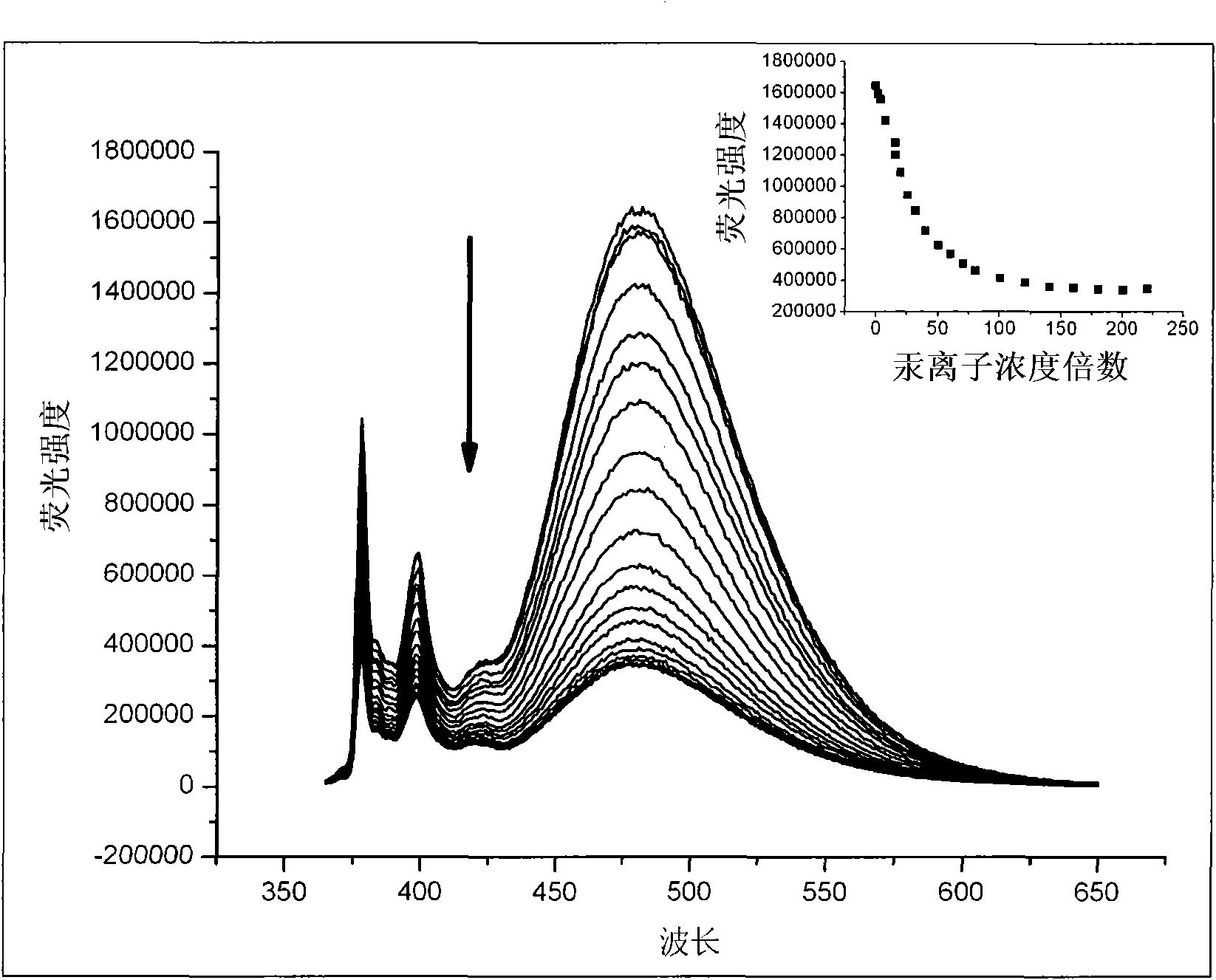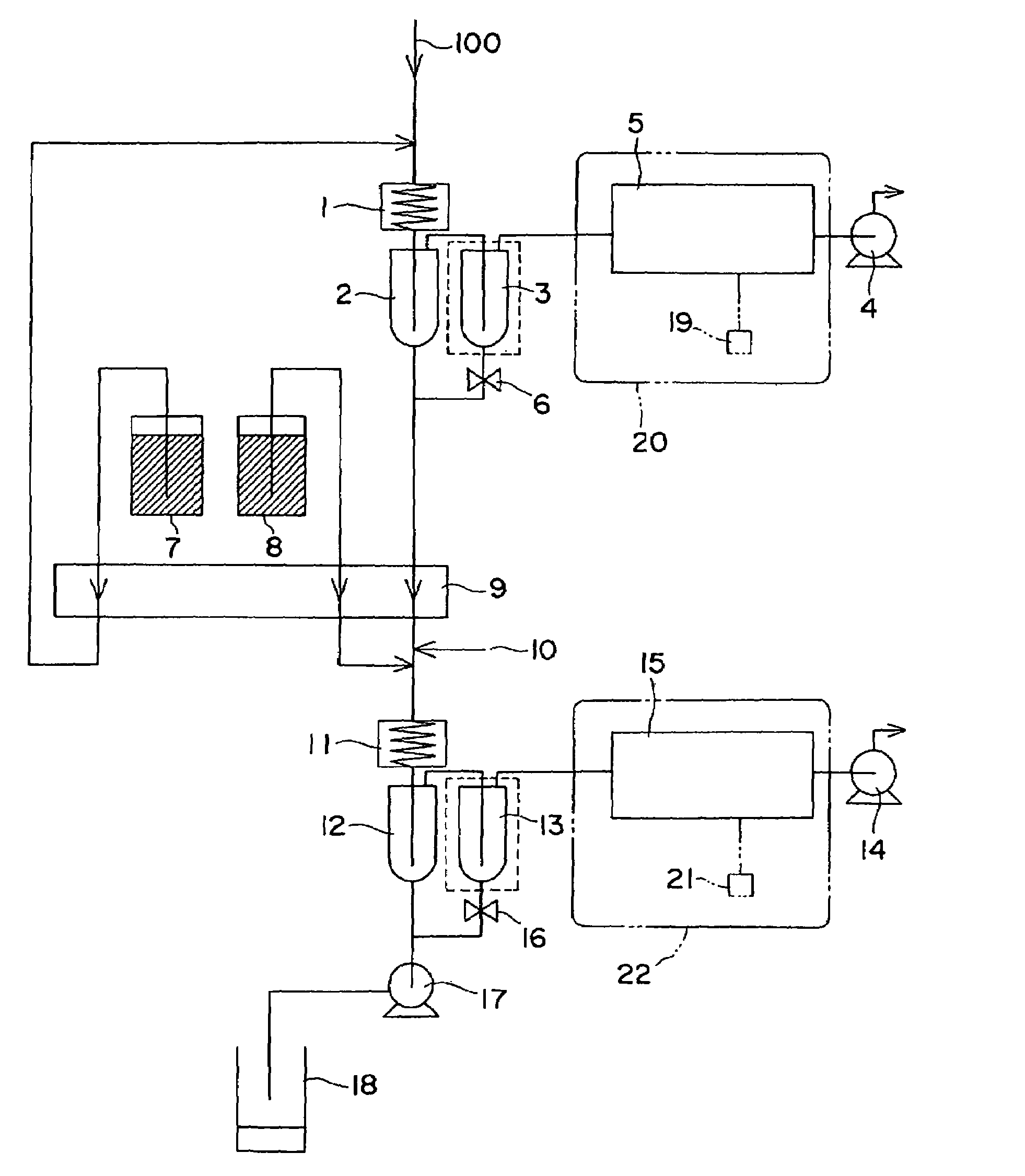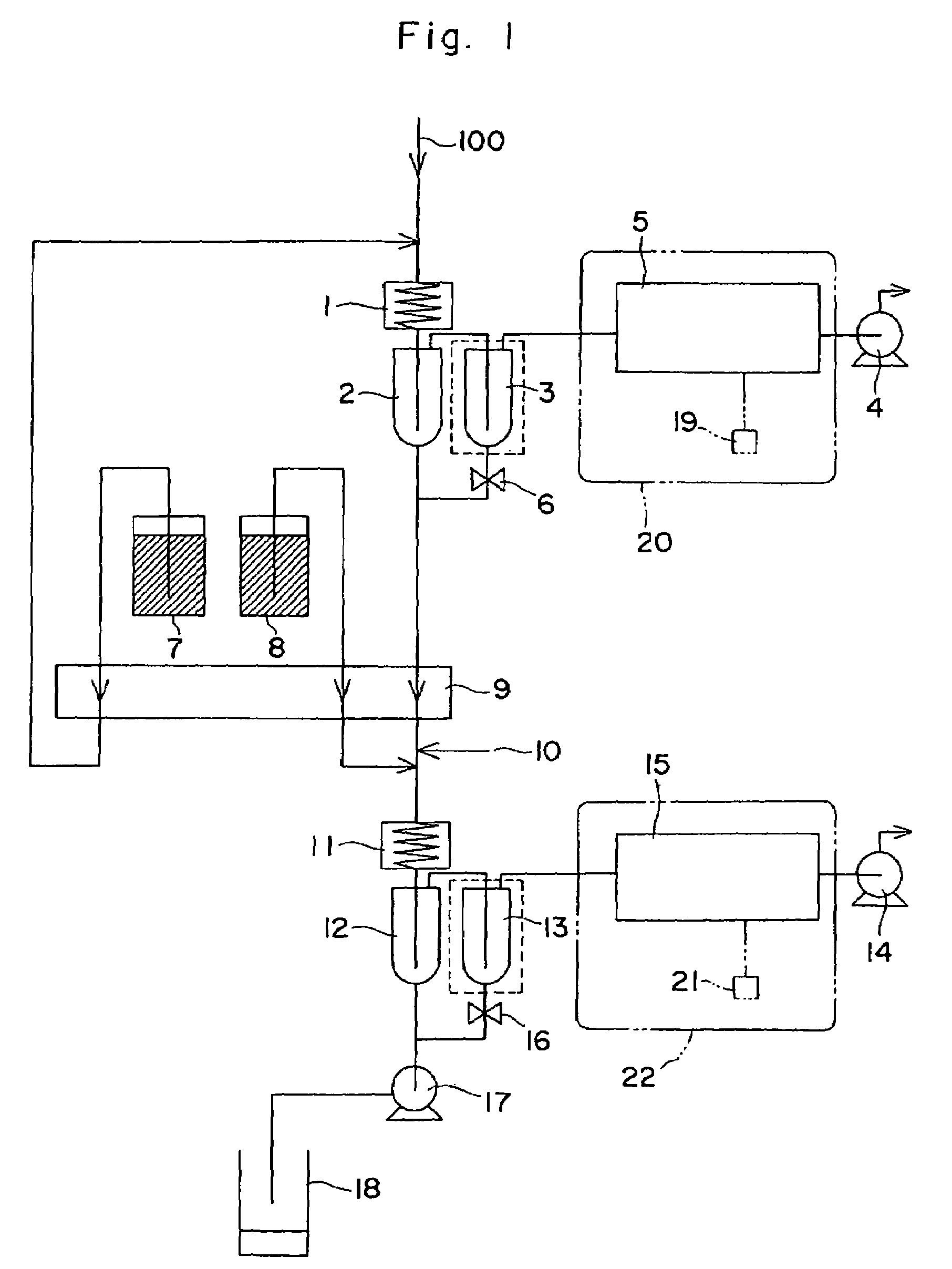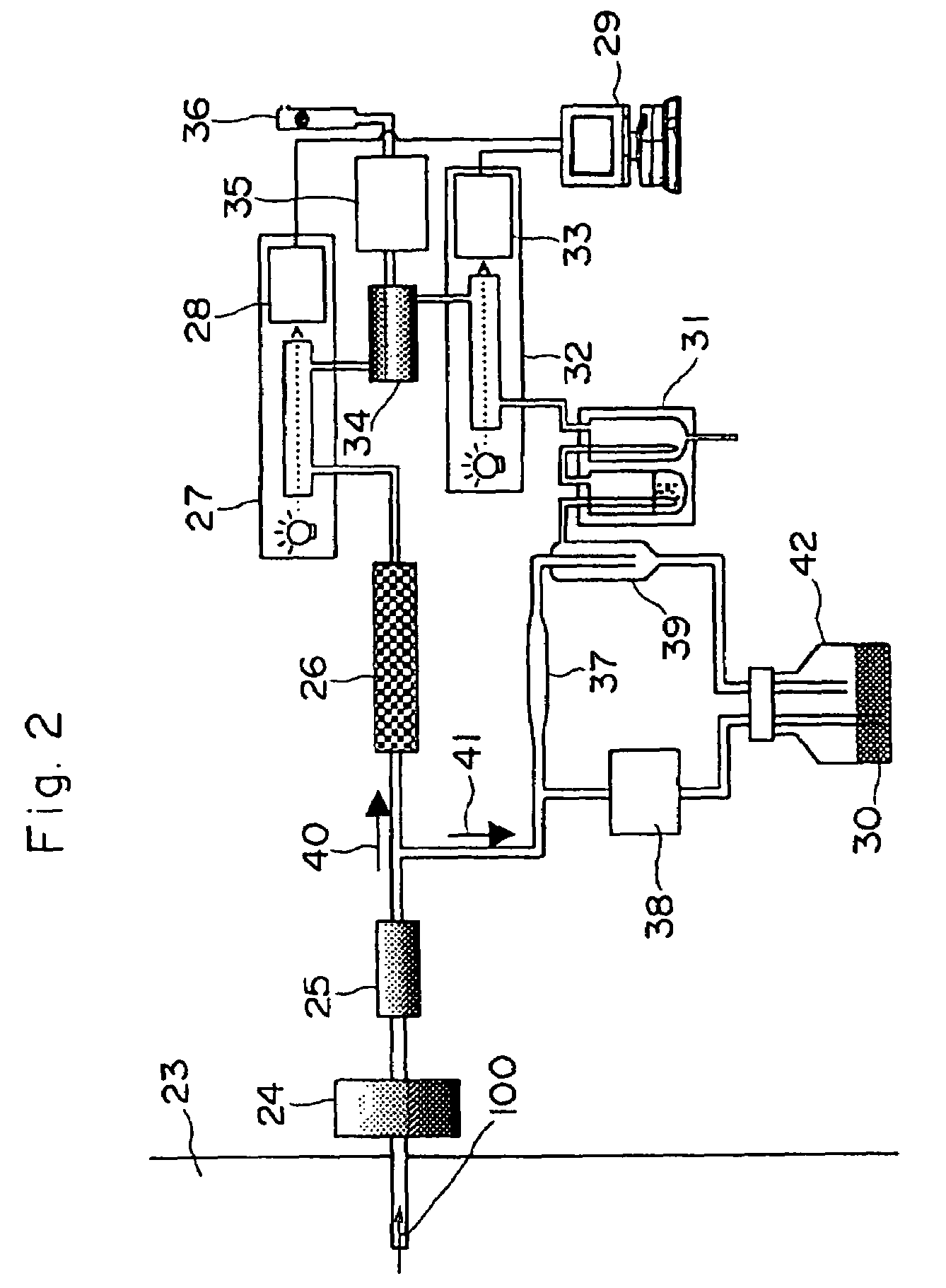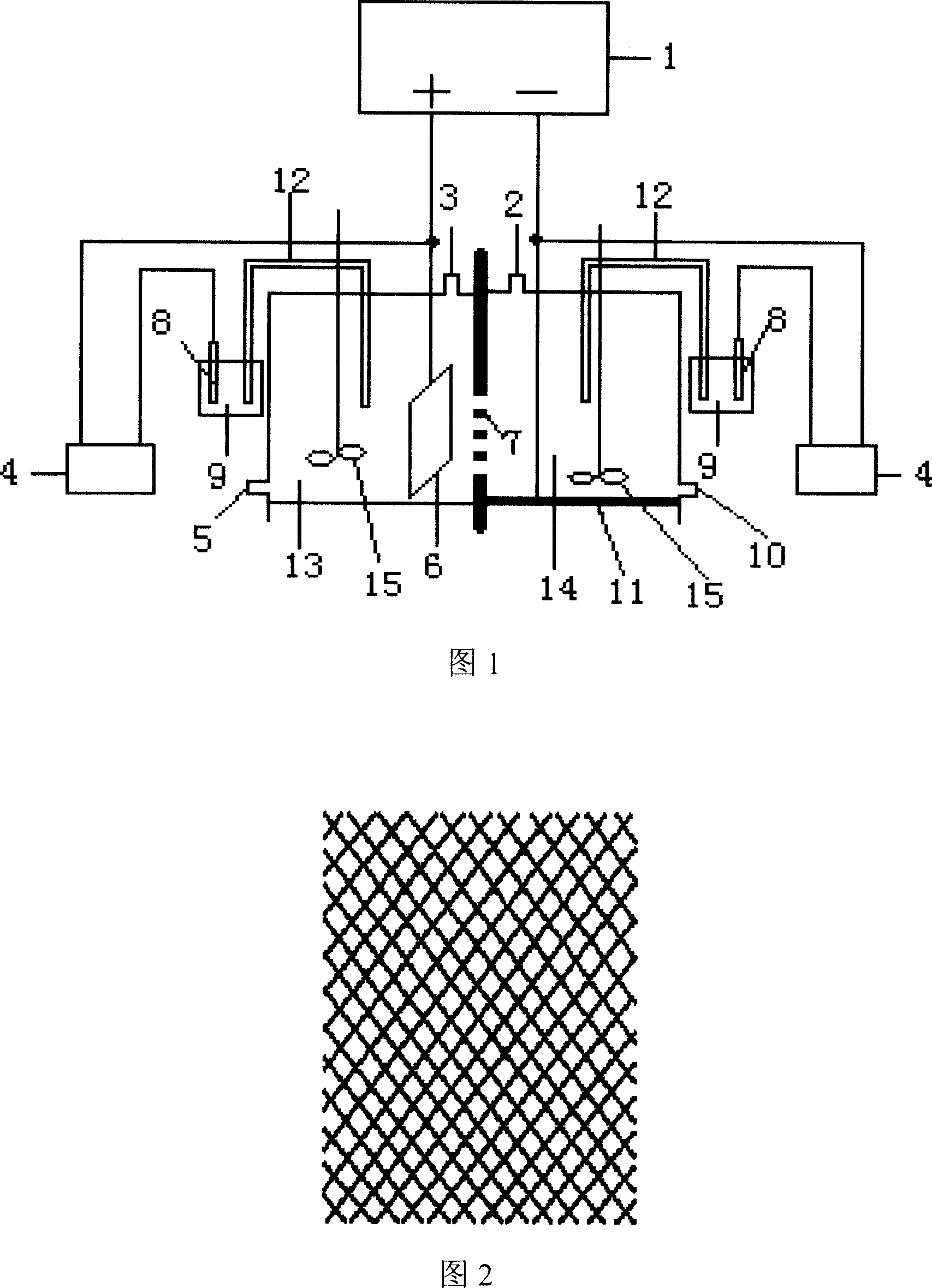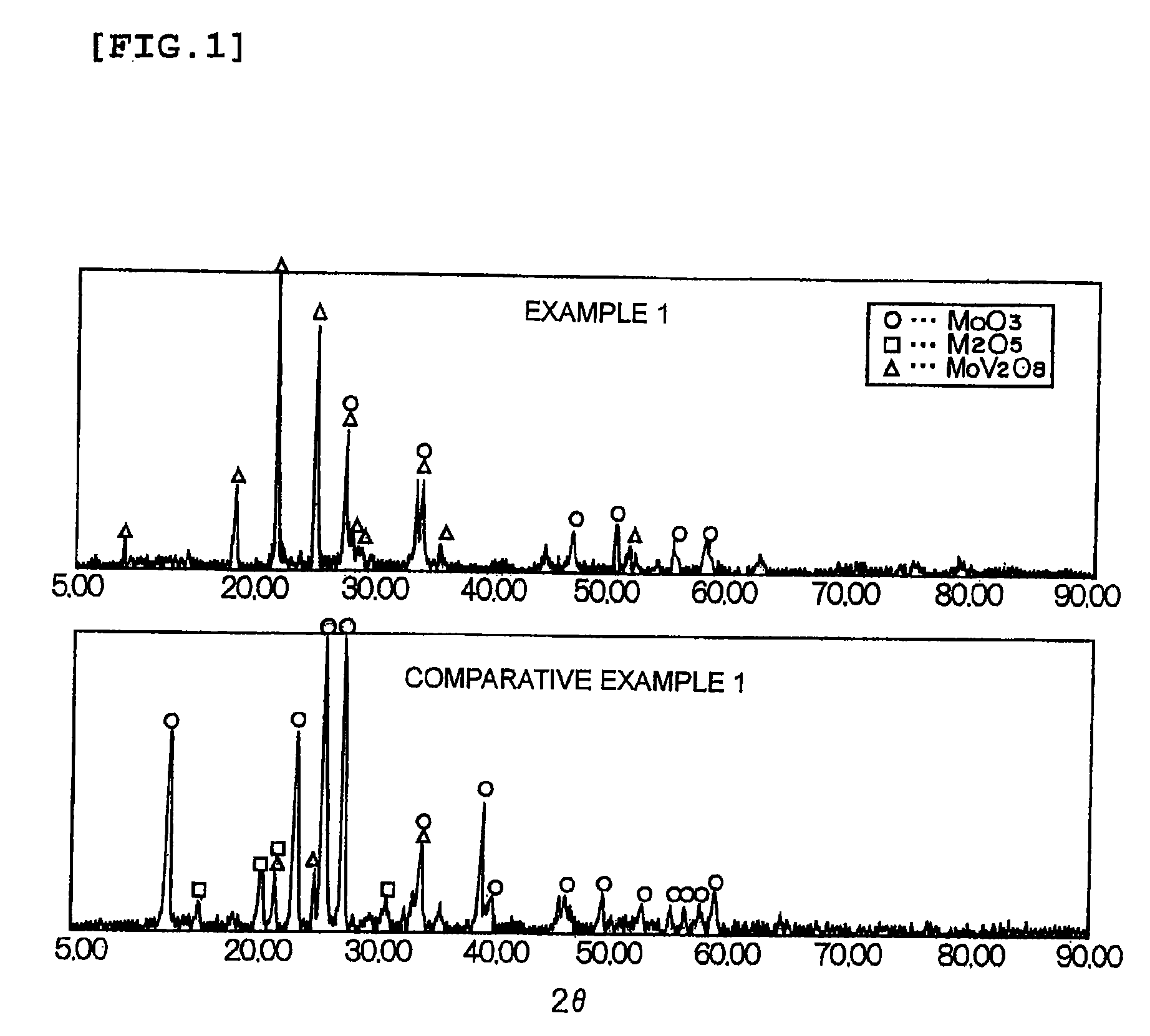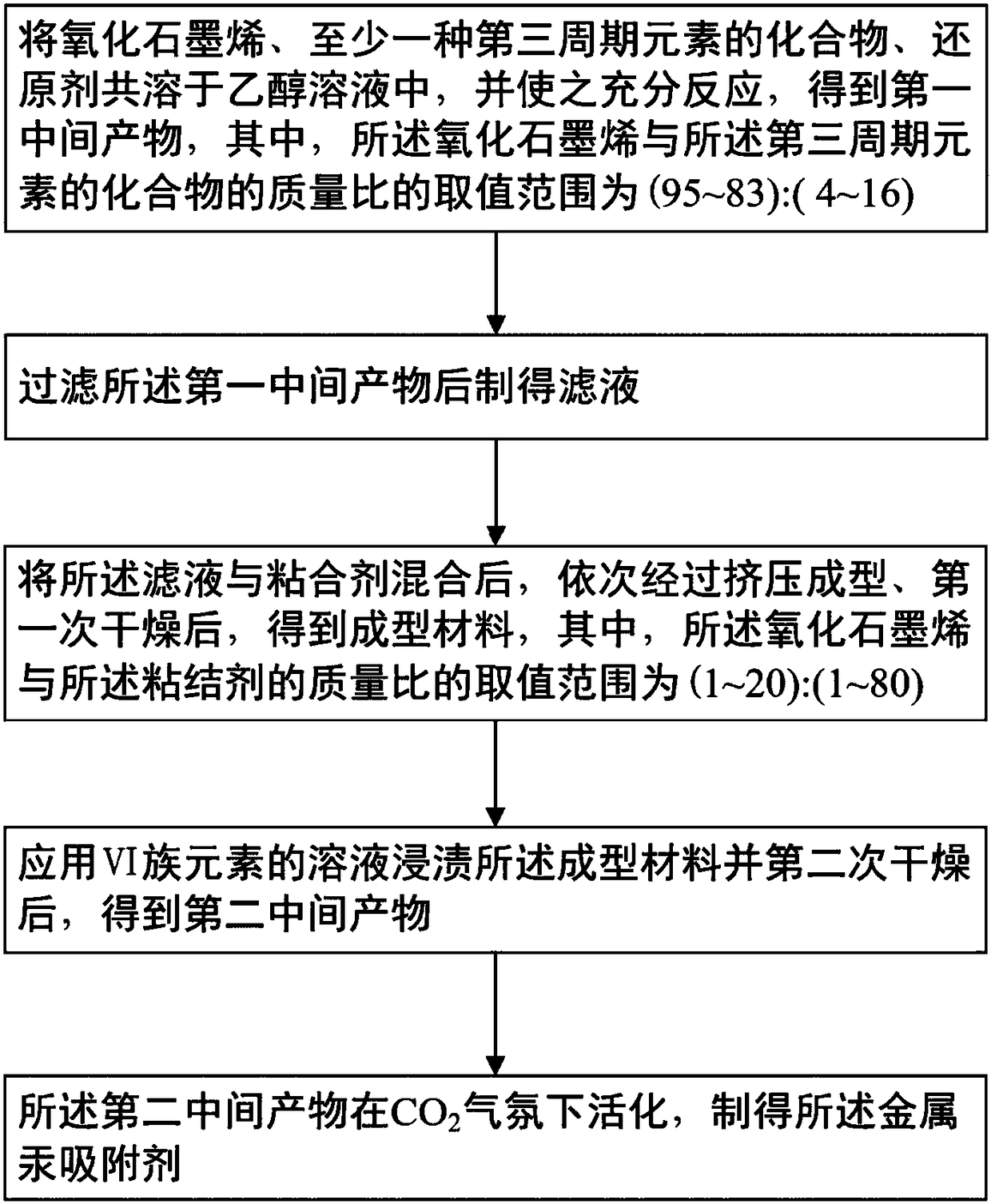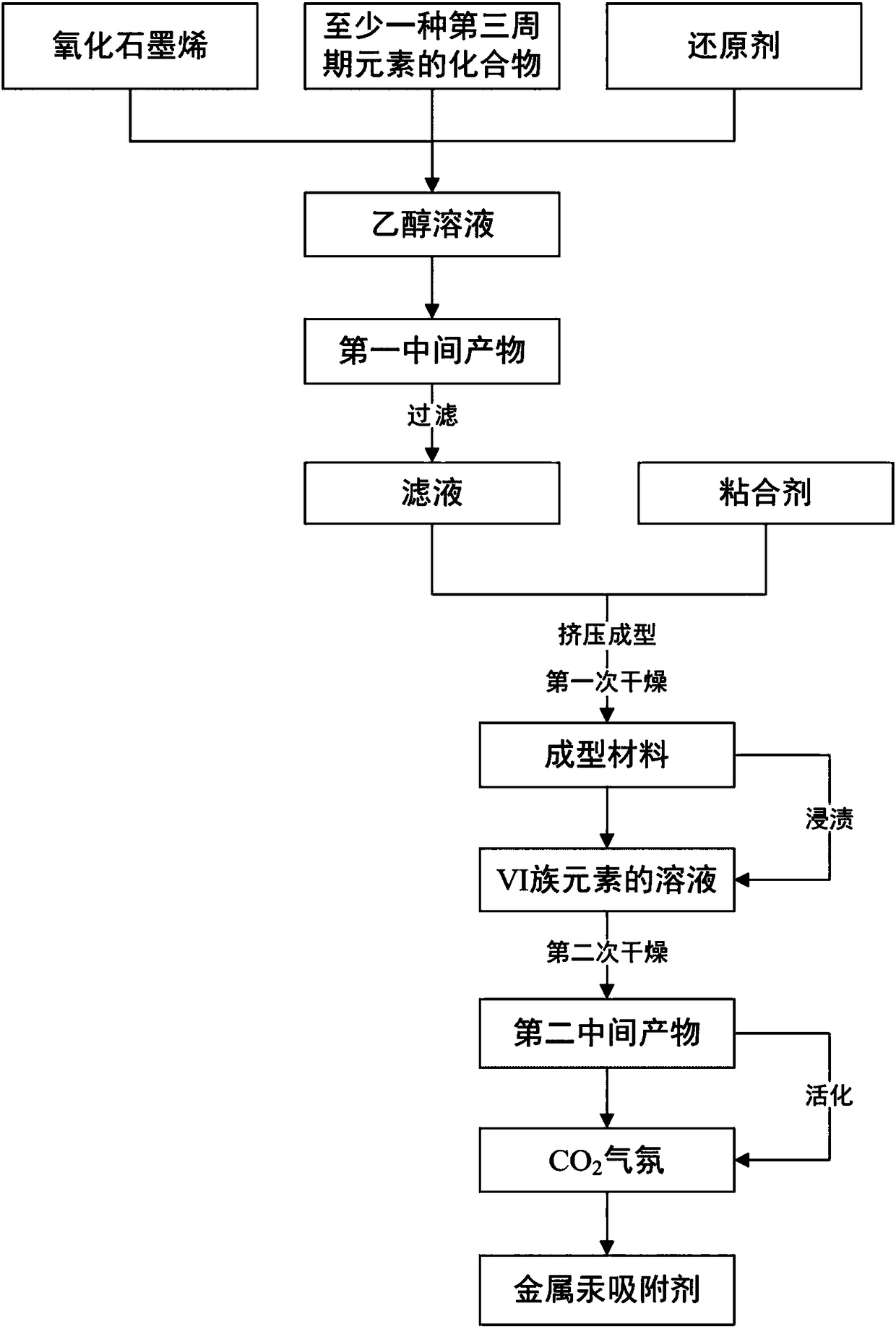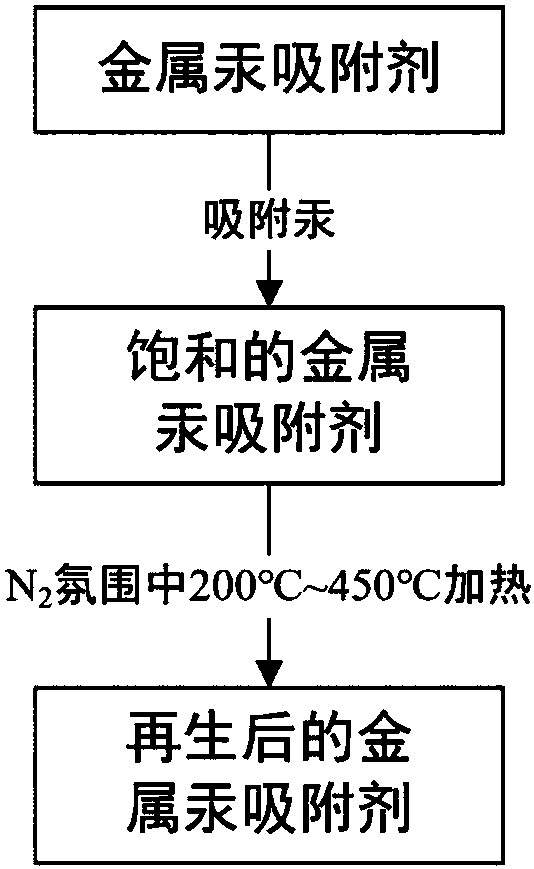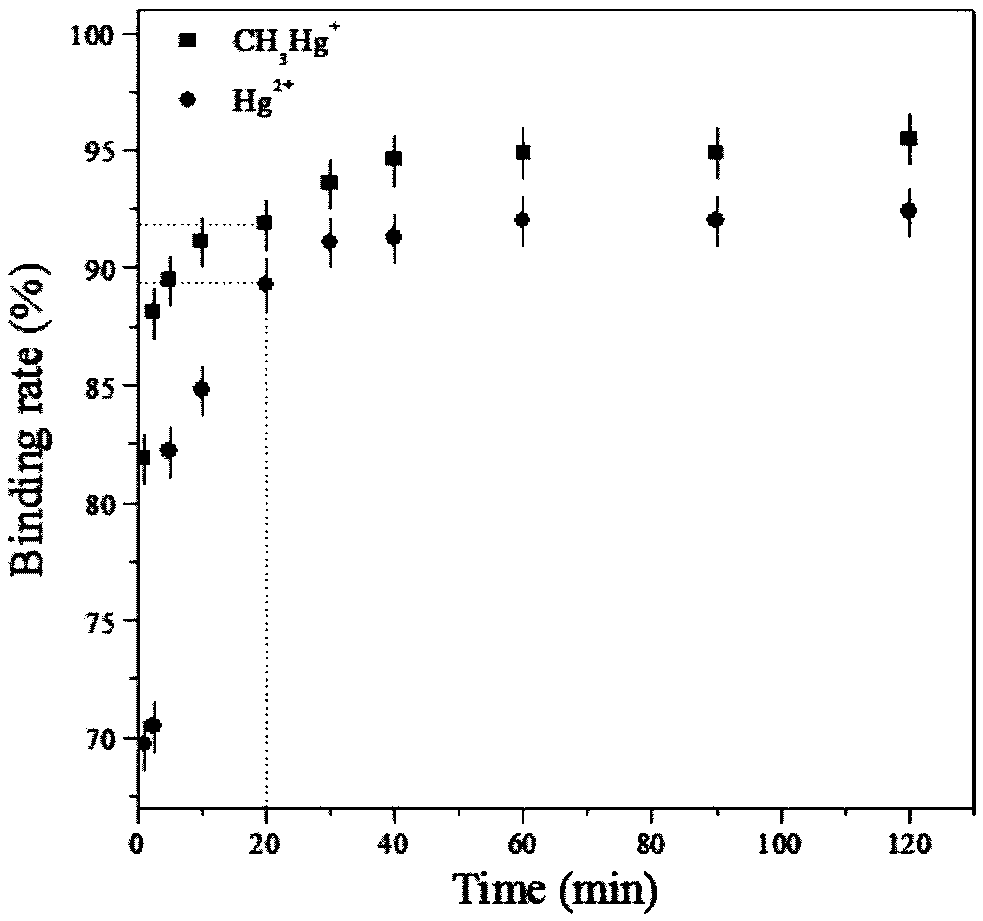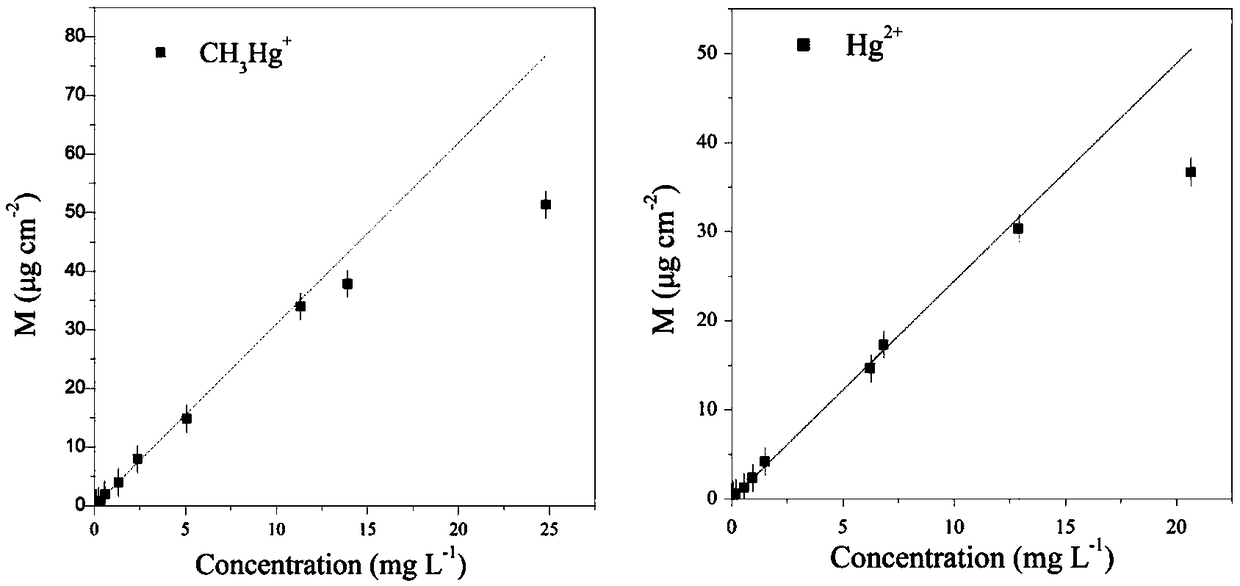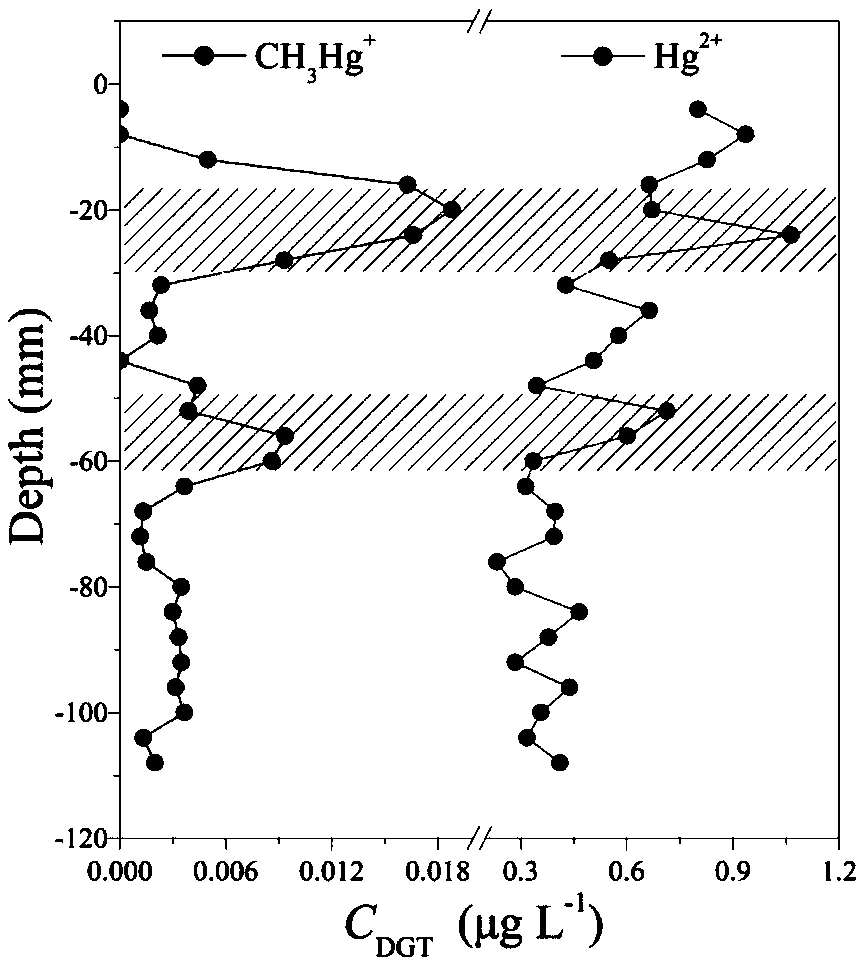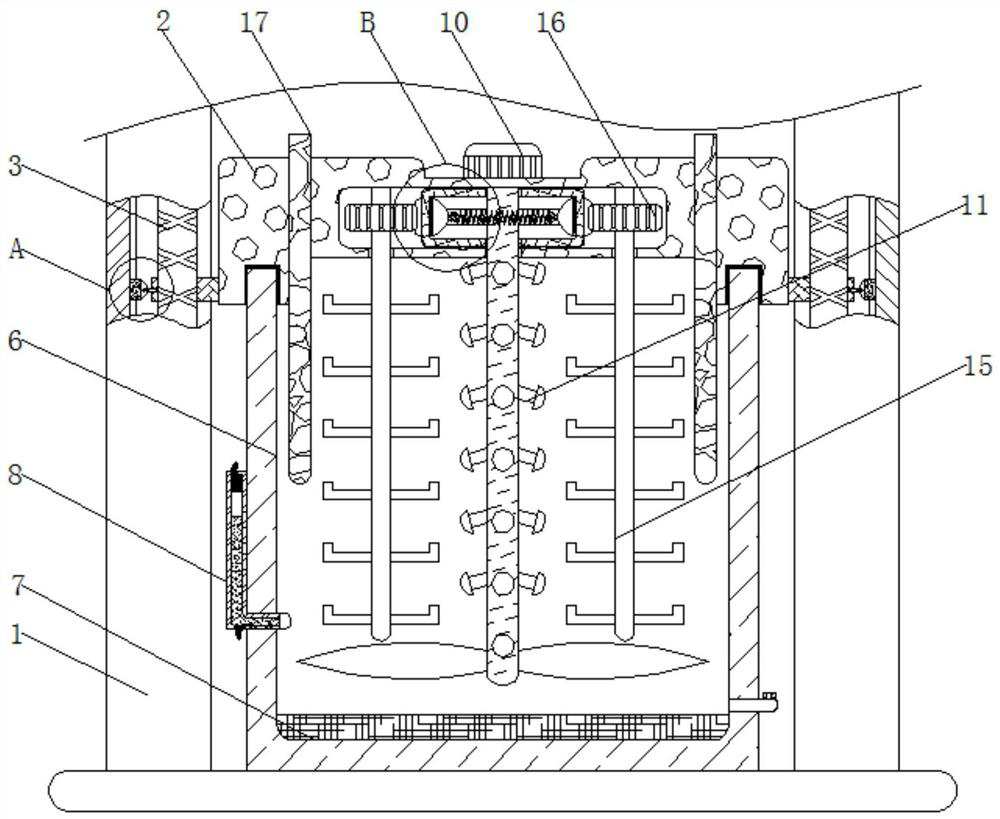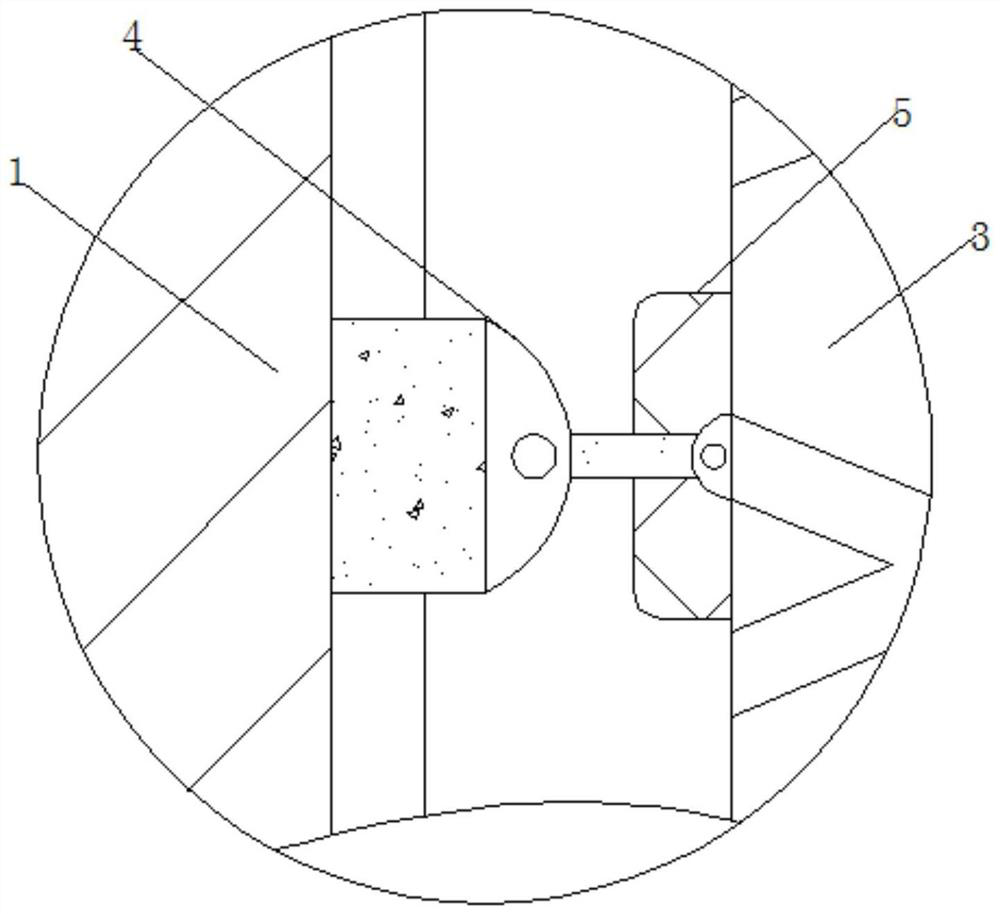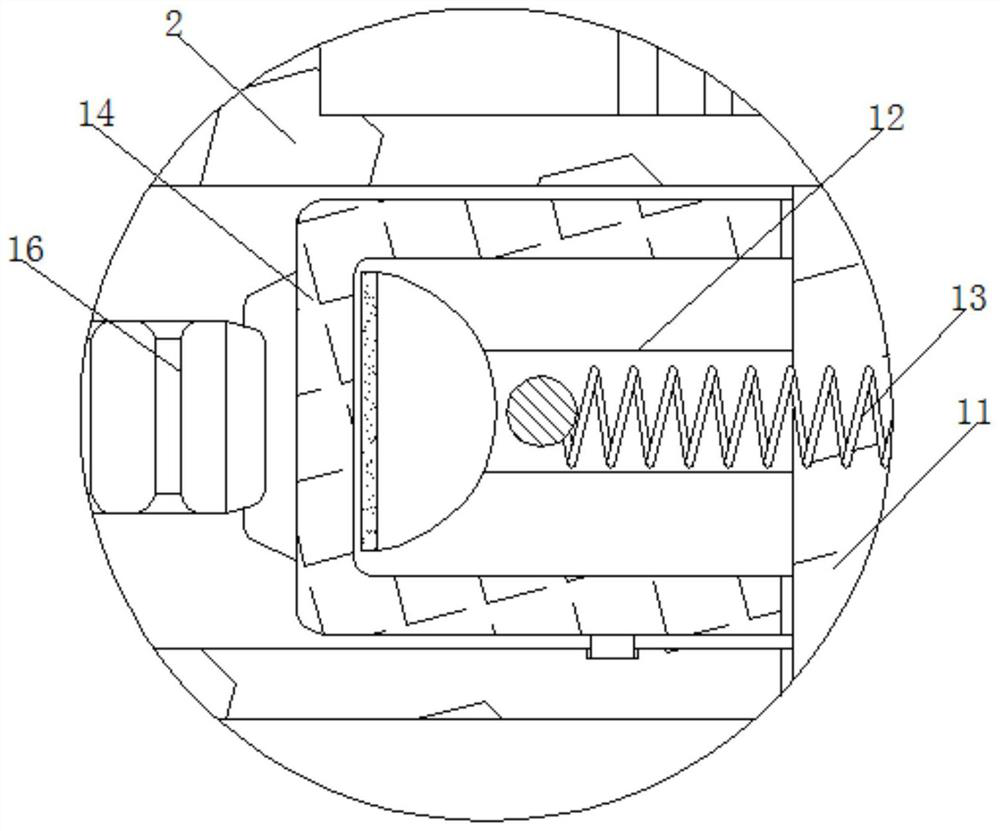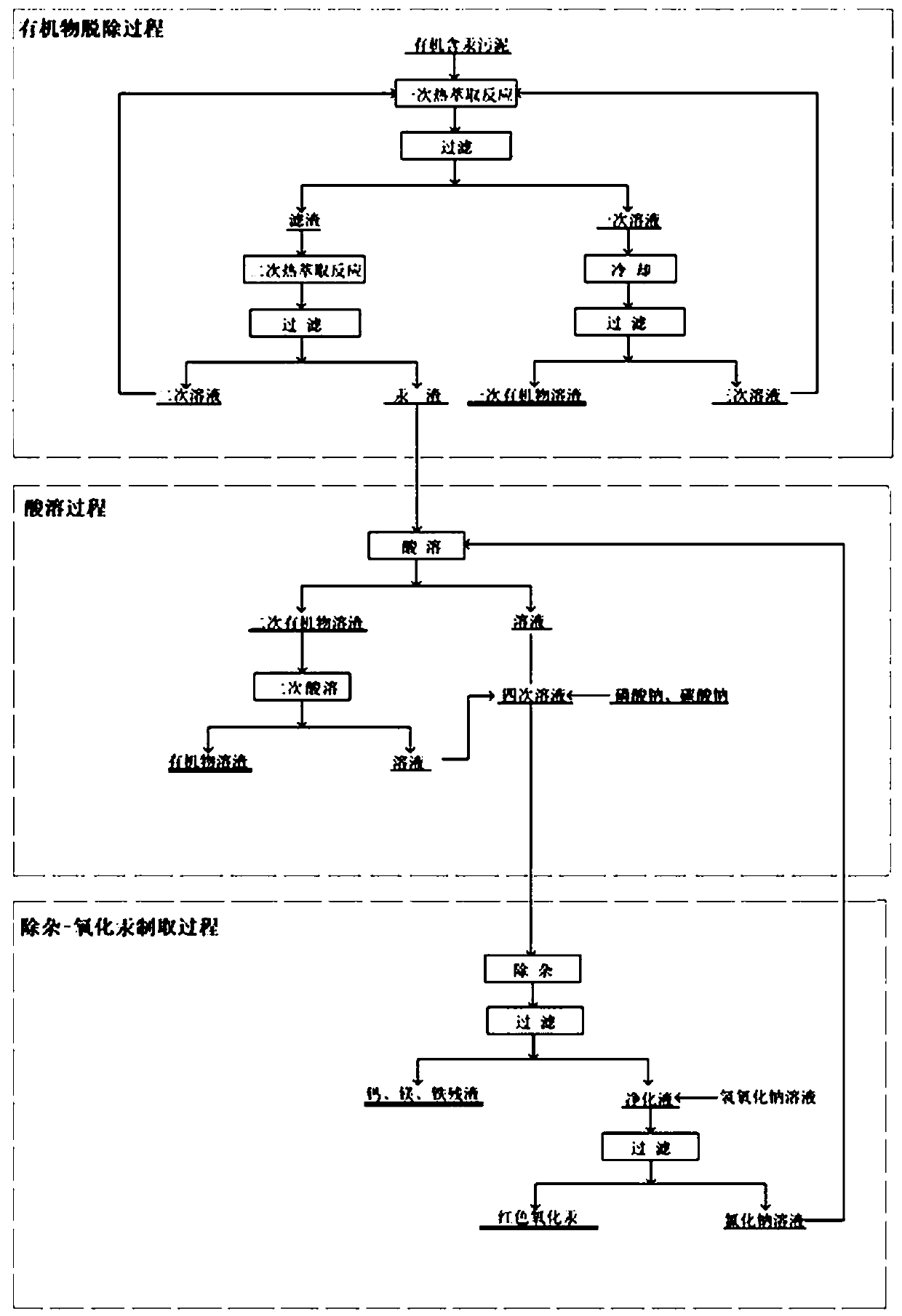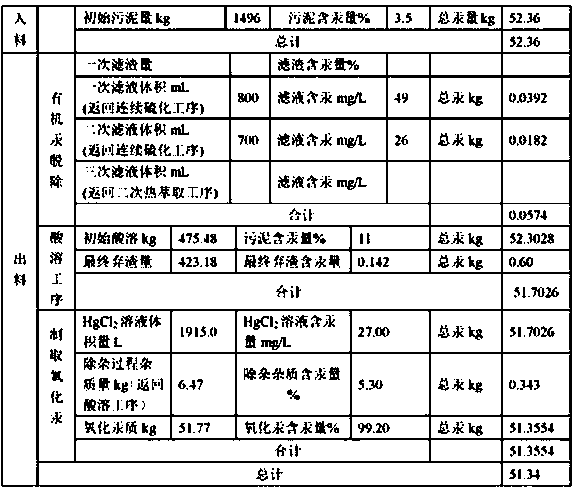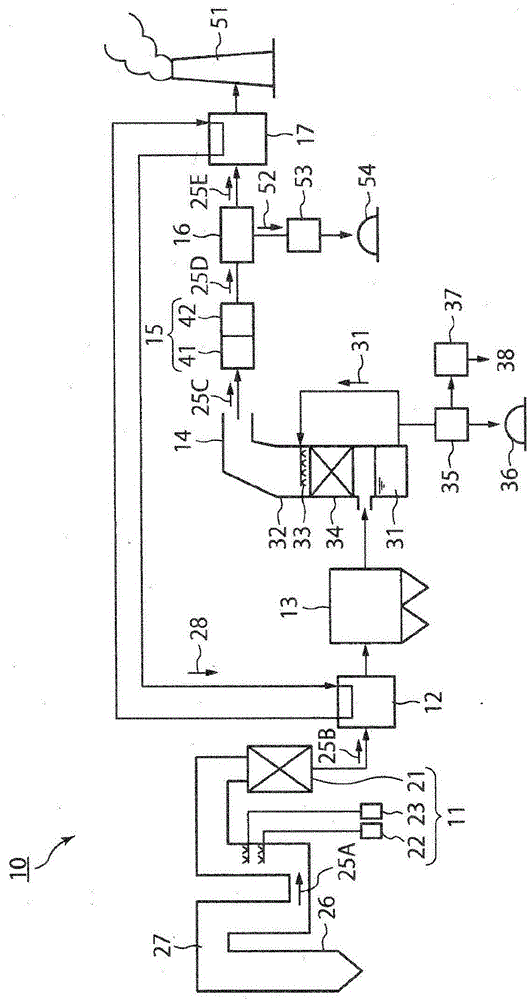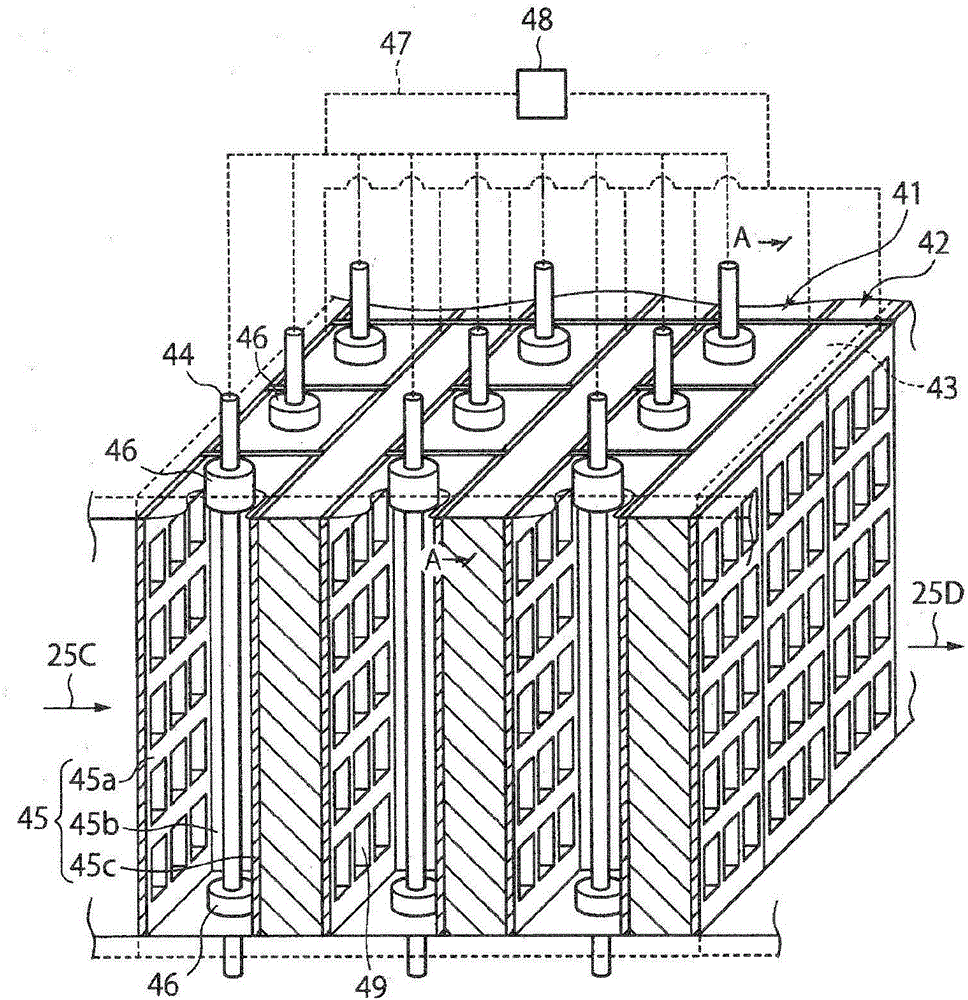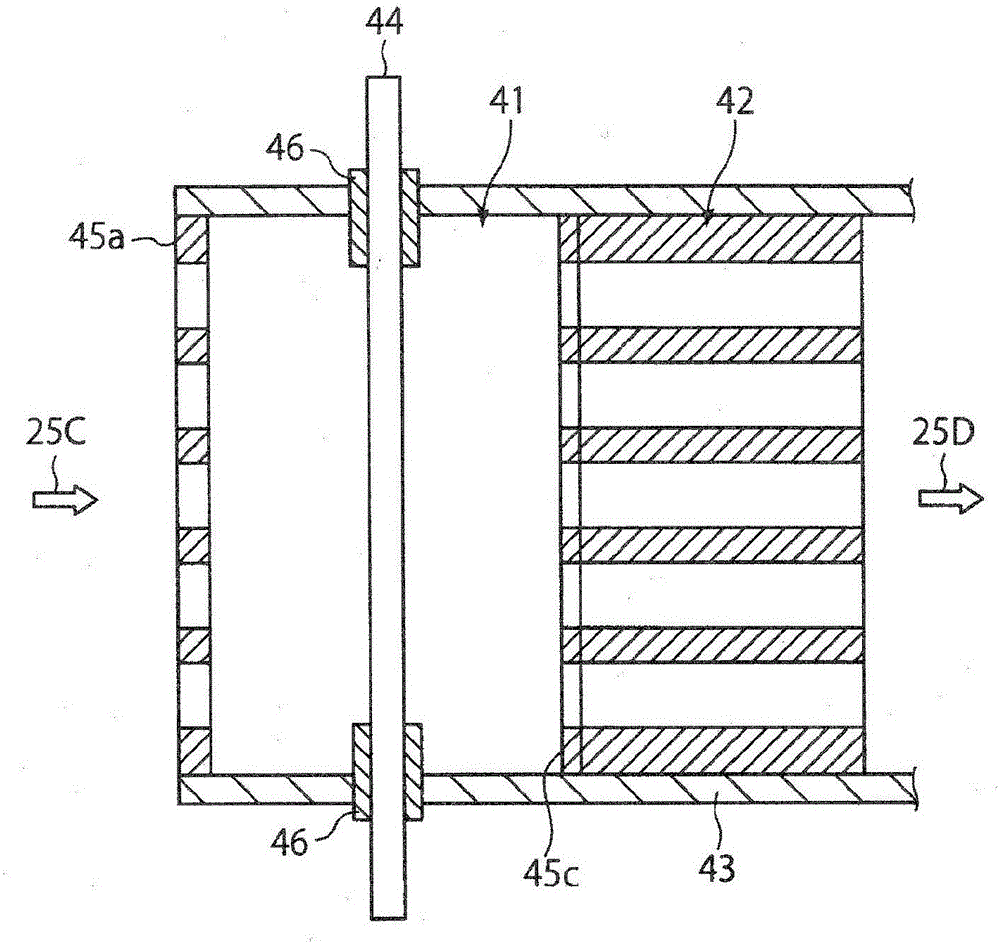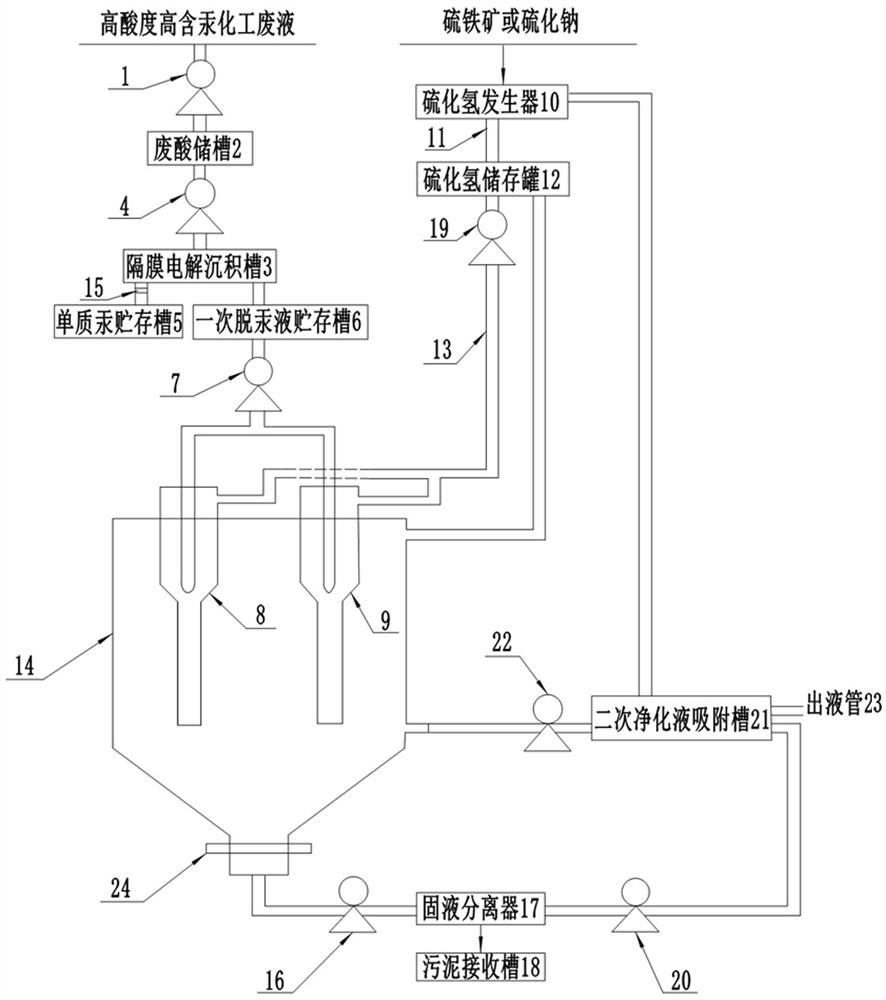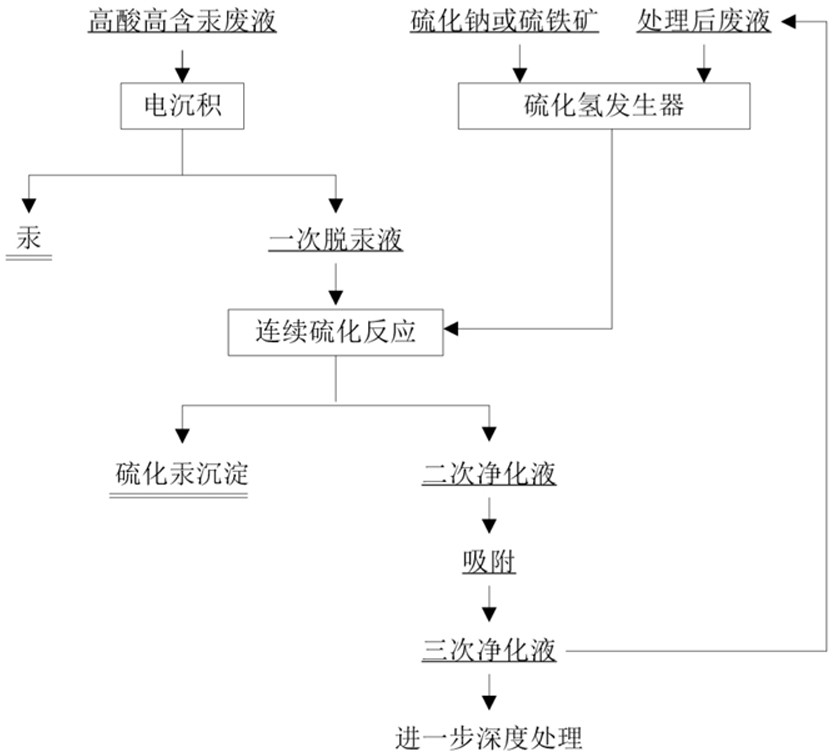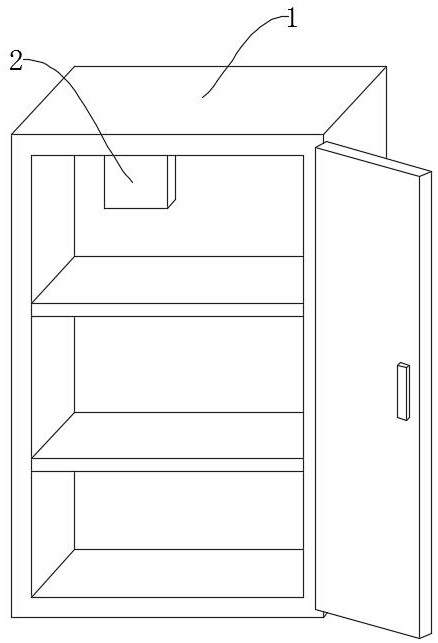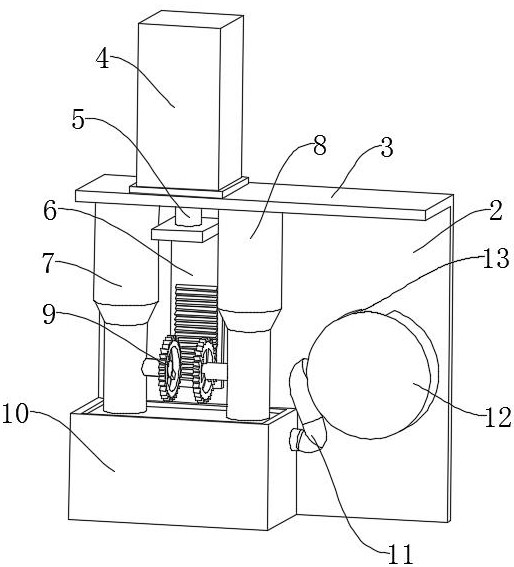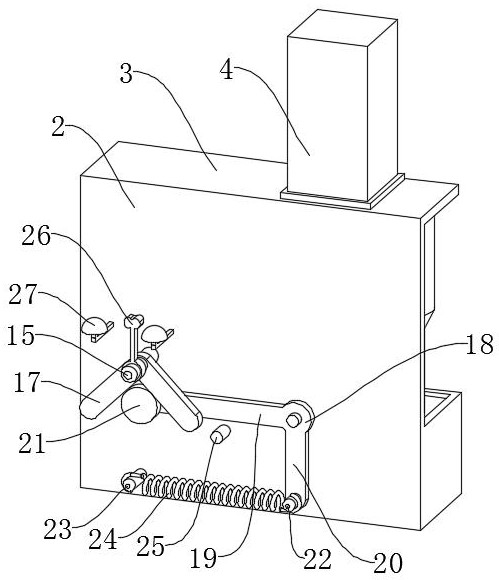Patents
Literature
57 results about "Metal mercury" patented technology
Efficacy Topic
Property
Owner
Technical Advancement
Application Domain
Technology Topic
Technology Field Word
Patent Country/Region
Patent Type
Patent Status
Application Year
Inventor
Mercury is the only common metal which is liquid at ordinary temperatures. Mercury is sometimes called quicksilver. It is a heavy, silvery-white liquid metal. It is a rather poor conductor of heat if compared with other metals but it is a fair conductor of electricity.
Method for treating exhaust gas
An object of the present invention is to provide a new method for treating an exhaust gas, which can effectively treat an exhaust gas containing a nitrogen oxide and metal mercury over a long term, and also can be applied to treatment of a large volume of an exhaust gas. As a means of achieving this object, a method according to the present invention for treating an exhaust gas comprises performing a reaction of changing metal mercury into mercury halide in the presence of a halogen compound and treatment of a nitrogen oxide, using a Ti—V-containing catalyst, upon treatment of an exhaust gas containing a nitrogen oxide and metal mercury.
Owner:NIPPON SHOKUBAI CO LTD
Multi-amino carbon composite material for selectively fixing mercury, chromium and lead in polluted soil and preparation method
InactiveCN104941575AImplement select fixed fixesLow costOther chemical processesContaminated soil reclamationEthylenediamineCarbon composites
The invention provides a preparation method of an ethylenediamine grafted modified biomass carbon composite material for selectively fixing metal mercury (II), chromium (III) and lead (II) in soil, aiming at solving the actual problems that an existing passivant has small adsorption capacity on heavy metal of the soil, low selectivity and bad safety. The novel multi-amino biomass carbon composite material agent takes common substances including agricultural straw biomass, hydrochloric acid, nitric acid, ethylenediamine and the like as raw materials and is prepared through carbonization, carboxylation and molecule copolycondensation, and has abundant pore channels and abundant content of surface multi-amino groups; and the product has large fixed capacity and good selectivity on mercury (II), chromium (III) and lead (II) in the heavy metal polluted soil, has the advantages of simple process, easiness for implementation and the like, and can be produced in a large batch.
Owner:NANJING AGRICULTURAL UNIVERSITY
Catalyst for oxidation of metal mercury
ActiveUS7842644B2Efficiently oxidizedImprove performanceDispersed particle filtrationElectrostatic separationHoneycomb likeMercury oxidation
A catalyst is provided having higher mercury oxidation performance than a conventional catalyst without increasing catalyst quantity or enhancing SO2 oxidation performance and constitutes an oxidation catalyst for metal mercury, which contains a molybdenum and vanadium complex oxide, for example, MoV2O8, as a main component having a catalytic activity and is formed by placing the molybdenum and vanadium complex oxide in layers only on the surface of a plate-like or honeycomb-like porous carrier. The porous carrier contains Ti and W and has a function of an NOx removal catalyst as a whole.
Owner:MITSUBISHI POWER LTD
Rhodamine fluorescent probe capable of detecting and separating heavy metal ions, and preparation method of rhodamine fluorescent probe
ActiveCN104140431ARealize multiple reuseOrganic chemistryOther chemical processesMagnetite NanoparticlesCyclodextrin
The invention provides a rhodamine fluorescent probe capable of detecting and separating heavy metal ions, and a preparation method of the rhodamine fluorescent probe, belonging to the field of a functional material. The fluorescent probe is prepared by comprising the following steps: modifying rhodamine B (RhB) serving as raw material so that the terminal has an azobenzene group; preparing the rhodamine fluorescent probe capable of detecting metal mercury ions and having a relatively low detection limit. By utilizing subjective-objective clathration action of azobenzene and cyclodextrin and taking the cyclodextrin magnetic nanoparticles prepared in advance as an adsorbent, the clathrated fluorescent probe and the detected metal ions can be separated from a solution under the action of an external magnetic field; furthermore, by utilizing the photoreaction property of the azobenzene group, the removal of heavy metal ions and the repeated use of the cyclodextrin magnetic nanoparticles can be realized. The rhodamine derivative has relatively good identification capability to mercury ions in the aqueous solution, thus being used as a mercury ion detection and removal agent. As the fluorescent probe, the rhodamine derivative can be widely applied to the fields of environmental engineering, analysis and detection and the like.
Owner:JIANGNAN UNIV
Catalyst for oxidation of metal mercury
ActiveCN101528343AImprove wear resistanceHeterogenous catalyst chemical elementsDispersed particle separationHoneycomb likeMercury oxidation
The invention is directed to providing a catalyst having higher mercury oxidation performance than a conventional catalyst without increasing catalyst quantity or enhancing SO 2 oxidation performance and constitutes an oxidation catalyst for metal mercury, which contains a molybdenum and vanadium complex oxide, for example, MoV 2 O 8 , as a main component having a catalytic activity and which is formed by placing the molybdenum and vanadium complex oxide in layers only on the surface of a plate-like or honeycomb-like porous carrier. The porous carrier contains Ti and W and has a function of an NOx removal catalyst as a whole.
Owner:MITSUBISHI POWER LTD
High-sensitivity and high-selectivity metal mercury ion electrochemical sensor
ActiveCN104569085AHighly Selective Electrochemical DetectionFast deliveryMaterial electrochemical variablesModified dnaFerrocene
The invention relates to a high-sensitivity and high-selectivity metal mercury ion (Hg<2+>) electrochemical sensor. Based on an Au-S bonding effect, an Hg<2+>electrochemical sensor interface is constructed by self-assembling a sulfydryl-modified DNA capturing probe on the surface of a gold electrode. A synergetic hybrid effect can be generated by the strong affinity effect between thymine (T) of DNA and the Hg<2+> when the Hg<2+>, a DNA auxiliary probe and an electrochemical active molecule ferrocene (Fc) modifying DNA signal probe coexist; and a three-arm DNA Y-shaped structure is formed on the surface of the gold electrode so that an Fc molecule is close to the surface of the electrode. The size of oxidization current of the Fc is directly detected so that the concentration of the Hg<2+> in a solution is determined. The single Hg<2+> can be induced on the surface of the electrode to form one DNA Y-shaped structure so that the sensitivity and selectivity for detecting the Hg<2+> are very high. The sensor can be simply prepared, has short analysis time and good repeatability, is easy to update, and can be applied to the fields of environment monitoring, food safety and the like very well.
Owner:NANJING UNIV
Method for recovering mercury in situ from mercury fume in non-ferrous metal metallurgy
ActiveCN108310955AAchieving flocculation recoveryAvoid pollutionGas treatmentDispersed particle separationNon-ferrous extractive metallurgySmall footprint
The invention discloses a method for recovering mercury in situ from mercury fume in non-ferrous metal metallurgy. The method comprises the following steps: performing absorption and mercury removal on mercury fume to obtain mercury-containing acid mud, and performing flocculation concentration and dehydration on the mercury-containing acid mud to obtain mercury-containing mud residues; pre-treating the mercury-containing mud, performing incineration, and recovering liquid mercury in a centralized manner by virtue of a multistage mercury condensation and collection device. The method is simple, low in cost, small in occupied area and high in efficiency of collecting and recovering the metal mercury, construction can be performed nearby a mercury fume production area of non-ferrous metal metallurgy, and environmental risk existing in the process of shipping out and treating the mercury-containing acid mud and during transportation can be avoided. Moreover, tail gases containing trace mercury can be introduced into a mercury fume purification system in non-ferrous metal metallurgy to be subjected to mercury removal again, a special tail gas treatment device does not need to be constructed, secondary pollution is effectively prevented from being avoided, and the method is simple and can be used on a large scale.
Owner:湖南西林环保材料有限公司
Method for treating exhaust gas
An object of the present invention is to provide a new method for treating an exhaust gas, which can effectively treat an exhaust gas containing a nitrogen oxide and metal mercury over a long term, and also can be applied to treatment of a large volume of an exhaust gas. As a means of achieving this object, a method according to the present invention for treating an exhaust gas comprises performing a reaction of changing metal mercury into mercury halide in the presence of a halogen compound and treatment of a nitrogen oxide, using a Ti—V-containing catalyst, upon treatment of an exhaust gas containing a nitrogen oxide and metal mercury.
Owner:NIPPON SHOKUBAI CO LTD
Treating device for waste slag containing mercury
InactiveCN1586742ANo pollutionSolid waste disposalRecycling and recovery technologiesSlagEmission standard
The present invention is mercury containing waste slag treating device, and especially one mercury recovering apparatus for mercury containing waste slag. The present invention features that the mercury recovering apparatus consists of air exhaust tower, blower, secondary active carbon adsorber, primary active carbon adsorber, cooling water pipe, mercury collecting chamber, condenser, mercury removing heating furnace, feeding barrel, no-mercury slag collecting barrel, etc., which are connected with pipeline to constitute one reliable effective sealed treating system. The present invention has no secondary environment pollution and can extract metal mercury from waste slag while treating the waste slag to exhaust standard.
Owner:上海申光照明电器有限公司
Sulfydryl DNA-modified gold nano-rod, preparation method thereof, heavy metal mercury ion detection method and application of heavy metal mercury ion detection method
ActiveCN108526484AAdjustable sizeEasy to retouchMaterial nanotechnologyTransportation and packagingNucleotideFluorescence
The invention discloses a sulfydryl DNA-modified gold nano-rod, a preparation method of the sulfydryl DNA-modified gold nano-rod, a heavy metal mercury ion detection method and the application of theheavy metal mercury ion detection method. The preparation method of the sulfydryl DNA-modified gold nano-rod comprises the steps that (1) CTAB and chloroauric acid are mixed, then sodium borohydride is added to conduct a contact reaction until the system becomes tawny, and then a seed solution is obtained; (2) CTAB, silver nitrate and chloroauric acid are mixed, ascorbic acid is added to conduct acontact reaction until the system becomes colorless, and a growth solution is obtained; (3) the seed solution and the growth solution are made to conduct a contact reaction, so that a gold nano-rod GNRs solution is obtained; (4) incubation and post-treatment are conducted on sulfydryl DNA and the gold nano-rod GNRs solution so that the sulfydryl DNA-modified gold nano-rod GNRs-ssDNA-2 is obtained. The sulfydryl DNA-modified gold nano-rod and Hg ions can form a T-Hg2+-T sandwich type structure so that a Cy5 nucleotide-gold nano-rod fluorescence resonance energy transfer system can be established to achieve Hg2+ detection.
Owner:ANHUI NORMAL UNIV
Method for repairing polluted soil through low-temperature thermal desorption with chemical drip washing
ActiveCN107398470AEfficient removalNot volatileContaminated soil reclamationLow-temperature thermal desorptionPollution
The invention discloses a method for repairing polluted soil through low-temperature thermal desorption with chemical drip washing. The method comprises the following steps: firstly, performing low-temperature thermal desorption treatment on mercury polluted soil so as to remove metal mercury, organic combined mercury and a part of inorganic combined mercury with a low melting point in the soil; secondly, performing drip washing with a mixed liquid containing organic acids, iodate and chlorine salts so as to remove mercuric oxide with a high melting point; and finally performing drip washing on mercuric sulfide with a high melting point with a mixed liquid of sodium sulfide and sodium hydroxide. By adopting the method, efficient removal of mercury of multiple valence states in mercury polluted soil can be achieved, a small amount of mercury is retained, the removal rate of mercury is up to 95% or greater, secondary pollution to the environment is avoided, and the cost is low.
Owner:AEROSPACE KAITIAN ENVIRONMENTAL TECH CO LTD
Method of regenerating used catalyst
ActiveUS20100093517A1Increases Hg oxidation activityOxidation rate is lowGas treatmentOther chemical processesHeteropoly acidPhosphate ion
[Problem] Provided is a method for regenerating a catalyst, the method decreasing the SO2 oxidation rate, which has been increased by Fe and V compounds, of a spent denitration catalyst to an extremely low level, and improves the oxidation activity of the catalyst for metal mercury by the regeneration treatment.[Solving Means] A method for regenerating a catalyst, including steps of immersing a spent denitration catalyst composed mainly of titanium oxide in (a) a mixed aqueous solution containing phosphate ions and oxo-acid ions of one or more elements selected from vanadium (V), molybdenum (Mo), and tungsten (W), (b) a heteropoly acid compound aqueous solution containing phosphorus and one or more elements selected from V, M, and W, or (c) a mixed aqueous solution containing a phosphate compound and a vanadyl compound, and then drying the catalyst.
Owner:MITSUBISHI POWER LTD
Method of regenerating used catalyst
ActiveUS9067194B2Improve oxidation activityGas treatmentOther chemical processesPhosphate ionHeteropoly acid
[Problem] Provided is a method for regenerating a catalyst, the method decreasing the SO2 oxidation rate, which has been increased by Fe and V compounds, of a spent denitration catalyst to an extremely low level, and improves the oxidation activity of the catalyst for metal mercury by the regeneration treatment.[Solving Means] A method for regenerating a catalyst, including steps of immersing a spent denitration catalyst composed mainly of titanium oxide in (a) a mixed aqueous solution containing phosphate ions and oxo-acid ions of one or more elements selected from vanadium (V), molybdenum (Mo), and tungsten (W), (b) a heteropoly acid compound aqueous solution containing phosphorus and one or more elements selected from V, M, and W, or (c) a mixed aqueous solution containing a phosphate compound and a vanadyl compound, and then drying the catalyst.
Owner:MITSUBISHI POWER LTD
Method for repairing mercury polluted soil through combination of low-temperature thermal desorption and chemicals
ActiveCN107398472AAchieve removalAchieve stabilizationContaminated soil reclamationVulcanizationClay minerals
The invention discloses a method for repairing mercury polluted soil through combination of low-temperature thermal desorption and chemicals. The method comprises the following steps: firstly, performing low-temperature thermal desorption treatment on mercury polluted soil so as to remove metal mercury, organic combined mercury and a part of inorganic combined mercury with a low melting point in the soil; and performing a vulcanization reaction with a sulfurizing salt solution, further adding excessive ferrite precipitate S2-, further adding clay minerals and humus for adsorption, adding a pH adjusting agent to adjust the pH value of the mercury polluted soil to 6-7, and maintaining for more than 3 days. By adopting the method, removal of mercury of mercury with a low melting point in soil and immobilization of mercury of a high melting point are achieved, migration and biological availability of the mercury in the soil are greatly reduced, and compared with a conventional mercury polluted soil treatment method, the method has the characteristics of being good in repairing effect, small in chemical amount, low in energy consumption and free of soil structure damage.
Owner:AEROSPACE KAITIAN ENVIRONMENTAL TECH CO LTD
Application of neutral anion fluorescent chemical sensor
InactiveCN101566625AResolve interferenceEliminate distractionsFluorescence/phosphorescenceCholic acidFluorescence
The invention discloses the application of a neutral anion fluorescent chemical sensor in mercury ion fluorescent detection. The sensor comprises a cholic acid molecule framework, an anion bonding unit thiourea or uramido and a sensed signal unit fluorescent molecular group and has a structural formula shown at the right side, wherein the R1 and R2 are the same fluorescent chemical groups; eitheror both of the R3 and R4 contain the thiourea group which can react with the mercury ions; 3, 7, 12 and 24 respectively indicate the carbon atoms of 3-, 7-, 12- and 24-position in the cholic acid molecule framework and the carbon atoms are respectively marked as C3, C7, C12 and C24; and the sensor is used for selectively sensing and responding metal mercury ions. The invention discloses the neutral anion fluorescent chemical sensor, which overcomes the silver ion and copper ion interference problems in the existing mercury ion detection and the detection sensitiveness can reach 1.0*10<-7> mol.L<-1>.
Owner:EAST CHINA NORMAL UNIV
Fe3O4-rGO (reduced graphene oxide)-Ag composite material, method for preparing same and application of Fe3O4-rGO-Ag composite material
InactiveCN107029667AImprove adsorption capacityAchieving Removal EfficiencyGas treatmentOther chemical processesActive componentEconomic benefits
The invention discloses an Fe3O4-rGO (reduced graphene oxide)-Ag composite material. Active components Fe3O4 and Ag are loaded on graphene oxide (GO) which is a carrier to obtain the Fe3O4-rGO-Ag composite material. The invention further discloses a method for preparing the Fe3O4-rGO-Ag composite material and application thereof. The Fe3O4-rGO-Ag composite material, the method and the application have the advantages that characteristics of large specific surface areas and multiple functional groups of reduced graphene oxide are utilized, silver and iron which are good in adsorption performance can be loaded, the silver is precious metal, the iron is a magnetic material, and accordingly the zero-valent mercury removal efficiency can reach 90% at least; magnetic composite adsorption materials can be separated and recycled by magnetic separation means, can be regenerated at the high temperatures and then can be reused, metal mercury with extremely high purity can be recycled, accordingly, the operation cost can be reduced to a great extent, and the Fe3O4-rGO-Ag composite material and the method can have direct economic benefits.
Owner:ZHENGZHOU UNIVERSITY OF LIGHT INDUSTRY
Method and apparatus for continuous fractional analysis of metallic mercury and water-soluble mercury in a gas
InactiveUS7144736B2Easy to getReduce facility costsWeather/light/corrosion resistanceComponent separationFractional analysisProduct gas
A method and an apparatus which continuously separate and measure mercury in an exhaust gas in accordance with each chemical conformation and display a measurement result in real time. According to the method and the apparatus, water-soluble mercury in a gas is absorbed into an absorption solution (7), the gas and the absorption solution (7) are then separated from each other, the water-soluble mercury in the absorption solution (7) is reduced to be converted into gaseous metal mercury and led to an analyzer (20), and metal mercury in the gas which is not absorbed into the absorption solution (7) is led to an analyzer (22) in the form of gas. As a result, the water-soluble mercury and the non-water-soluble mercury contained in the gas can be captured and measured / analyzed in respective measurement systems in accordance with each chemical conformation. In addition, a concentration of the metal mercury and that of the water-soluble mercury in the gas can be continuously monitored in real time. In this analysis, it is preferable to use the absorption solution (7) to absorb an acid gas which is an inhibitive component to mercury measurement, together with the water-soluble mercury.
Owner:NIPPON INSTR CORP
Simultaneous process of electroreducing ytterbium and oxidizing cerium
InactiveCN1986895APrevent volatilizationPrevent dispersalPhotography auxillary processesProcess efficiency improvementCeriumIon-exchange membranes
The present invention is one electrolytic process of reducing Yb, enriching Tu and Lu, and oxidizing Ce simultaneously. The electrolytic process reduces Yb into bivalent Yb ion in the cathode chamber so as to separate out Yb from the enriched Yb, Tu and Lu; oxidizes Ce into four-valent ion so as to separate out Ce. The electrolytic equipment has cathode of metal mercury or amalgam, anode of inert metal, anion exchange membrane to separate the anode chamber from the cathode chamber, cathode solution of sulfuric acid solution of pH 0.1-4.0 with enriched Yb, Tu and Lu, and anode solution of sulfuric acid solution of acidity 0.01-3.0 mol / L with enriched Ce. The present invention has low production cost, best utilization of electrolytic current and other advantages.
Owner:北京方正稀土科技研究所有限公司 +2
Catalyst for oxidation of metal mercury
ActiveUS20090311155A1Efficiently oxidizedImprove performanceDispersed particle filtrationElectrostatic separationHoneycomb likeMercury oxidation
A catalyst is provided having higher mercury oxidation performance than a conventional catalyst without increasing catalyst quantity or enhancing SO2 oxidation performance and constitutes an oxidation catalyst for metal mercury, which contains a molybdenum and vanadium complex oxide, for example, MoV2O8, as a main component having a catalytic activity and is formed by placing the molybdenum and vanadium complex oxide in layers only on the surface of a plate-like or honeycomb-like porous carrier. The porous carrier contains Ti and W and has a function of an NOx removal catalyst as a whole.
Owner:MITSUBISHI POWER LTD
Chinese medicinal preparation for treating metal mercury poisoning
The invention relates to a Chinese medicinal preparation for treating metal mercury poisoning. The raw materials include: 50 parts of Smilax glabra, 15 parts of honeysuckle, 12 parts of Plantain Seed, 12 parts of rhizoma alismatis, 10 parts of cortex dictamni, 10 parts of rheum officinale, 12 parts of Radix Sophorae Flavescentis, 12 parts of tree peony bark, 10 parts of morinda officinalis, 10 parts of Malva verticillata L., and 10 parts of licorice. The preparation method of the ointment includes: weighing the raw materials 50 parts of Smilax glabra, 15 parts of honeysuckle, 12 parts of Plantain Seed, 12 parts of rhizoma alismatis, 10 parts of cortex dictamni, 10 parts of rheum officinale, 12 parts of Radix Sophorae Flavescentis, 12 parts of tree peony bark, 10 parts of morinda officinalis, 10 parts of Malva verticillata L., and 10 parts of licorice, preparing the materials into decoction pieces respectively, conducting autoclave steaming sterilization for 30-60min, and performing drying to obtain a sterile raw material, and making the sterile raw material into the Chinese medicinal preparation. With the efficacy of clearing heat and cooling blood, clearing toxin and promoting uresis, cleaning wound surfaces, and removing toxic pathogen, the Chinese medicinal preparation is used for treatment of metal mercury poisoning.
Owner:冯振江
Preparation method of metal mercury adsorbent, adsorbent and regeneration method
InactiveCN108392941ASuitable for industrial applicationsGas treatmentOther chemical processesAdhesiveSorbent
Owner:NORTH CHINA ELECTRIC POWER UNIV (BAODING)
Seashell monitoring method for fresh water environment heavy metal pollution
InactiveCN101122594AEasy to sampleThe pretreatment method is simpleGeneral water supply conservationTesting waterPretreatment methodFresh water organism
The invention relates to a shellfish monitoring method of freshwater environment heavy metal pollutant mercury pollution, which belongs to the biological monitoring environment technology field. The invention is characterized in that living heudes are selected to be raised in aerated water. Impurities in a shell and a digestive tract are eliminated. Then, the heudes are dissected and soft tissuesof the heudes are obtained and preserved in a refrigerator. The soft tissues are fetched out, thawed, washed with water, put in a drying box and dried to be of constant weight. Then, a anodonta woodiana living heude soft tissue dry sample is grinded to be powder. Together with activated alumina, sodium carbonate and calcium hydroxide, the power is made into a specimen. A mercury analyzer is used to detect the content of the heavy metal pollutant mercury in the heude. The invention has the advantages of convenient sampling and simple pretreatment method. The accumulation characteristics of theheavy metal mercury in the heude can be precisely detected. Concentration, components characteristics, pollution degree, biological toxicity effects and differences between waters of various pollutants can be rapidly known. The invention has the advantages of good stability, high reproducibility, high comparability and small system error. Harm risks on fishery waters and development trends of allpollutants can be precisely assessed and predicated.
Owner:FRESHWATER FISHERIES RES CENT OF CHINESE ACAD OF FISHERY SCI
Method for remediating Hg-polluted soil of farmland through plant
InactiveCN106424105ASolve the problem of high levels of heavy metal mercuryReduce mercury levelsContaminated soil reclamationEuphorbia esulaSoil remediation
The invention provides a method for remediating Hg-polluted soil of a farmland through plant, and belongs to the technical field of farmland soil remediation and treatment. The method for remediating the Hg-polluted soil of the farmland through the plant comprises the following steps: 1) applying fertilizer to the Hg-polluted soil to improve the soil fertility; and 2) planting euphorbia esula in the improved soil. According to the method for remediating the Hg-polluted soil of the farmland through the plant, the soil fertility is improved; an enriching crop, namely, euphorbia esula, is planted to enrich the heavy metal Hg in the polluted farmland, so that the problem of excessively high metal mercury content of the farmland soil can be solved.
Owner:BEIJING GEOENVIRON ENG & TECH
DGT fixing membrane for methylmercury and metal mercury ions in sediment, and preparation method thereof, DGT apparatus and eluent
PendingCN108745001AImprove adsorption capacityEasy to manufactureSemi-permeable membranesOther chemical processesCross-linkMethylmercury
The invention discloses a DGT fixing membrane for methylmercury and metal mercury ions in sediment, and a preparation method thereof, a DGT apparatus and an eluent, wherein the fixing membrane is formed by carrying out film forming and gelation on the mixed liquid of polyacrylamide, zirconium hydroxide hydrate and an isothiourea functionalized macroporous cross-linked polystyrene resin. Accordingto the present invention, with the fixing membrane, the mercury metal in the wetland soil sediment can be efficiently and quickly adsorbed and eluted so as to determine the mercury content.
Owner:南京智感环境科技有限公司
A method for determining the metal element mercury in soil
ActiveCN103196892BImprove measurement accuracyPreparing sample for investigationAnalysis by thermal excitationTest samplePre treatment
The invention discloses a method for measuring metallic element mercury in soil. The method comprises the steps of pre-treating a sample, drawing a solution working curve and measuring, wherein the pre-treating step comprises digesting various soil samples through an acid and treating the soil samples at high temperature to form a solution to be measured; and meanwhile, the measuring step comprises measuring the metallic element mercury through inductive coupling plasma atom emission spectrography, and selecting proper working parameters to quickly obtain the content of mercury in the test sample. The solution pre-treatment step in the measuring method is simple and economical; the measuring process is simple, the linear range is wide, and the operation is simple and quick; and meanwhile, the interference of different elements in the soil can be avoided during the measuring process.
Owner:广西益土检测技术有限公司
Electroplating and cleaning integrated device for small metal parts
InactiveCN111809224AEasy to take outAvoid taking out troublesome issuesCellsCleaning using liquidsElectrolytic agentMetallic materials
The invention relates to the technical field of metal material plating, and discloses an electroplating and cleaning integrated device for small metal parts. The electroplating and cleaning integrateddevice for the small metal parts comprises a bracket and a cover plate, wherein a screw rod is movably connected inside the bracket, a connecting rod is movably connected outside the screw rod, a sliding block is movably connected outside the connecting rod, a shell is fixedly connected outside the bracket, a heater is fixedly connected into the shell, and a packaging shell is fixedly connected to the outer portion of the shell. Under the interaction of the bracket, the cover plate, the screw rod, the connecting rod, the sliding block, the shell, the heater, the packaging shell and an electrode block, the device can take out an electroplated part more conveniently, the problem that the electroplated part is troublesome to take out due to the fact that electroplating equipment is too heavyis solved, operation of the heater is regulated and controlled through thermal expansion and cold contraction of metal mercury, the temperature of the electrolyte can be kept in the optimal use rangeall the time, and it is guaranteed that electroplating operation is conducted smoothly.
Owner:张宽波
Method for directly preparing mercury oxide from mercury-containing organic sludge
ActiveCN111268718AEfficient removalHigh removal rateSludge treatmentWater contaminantsAnthraquinonesWarm water
The invention provides a method for directly preparing mercury oxide from mercury-containing organic sludge. The method comprises an organic matter removal process, an acid dissolution process and animpurity removal-mercury oxide preparation process. By utilizing the high difference of temperature gradient dissolution of anthraquinone byproduct organic matters and mercury compounds in water, warmwater is adopted for thermal extraction in organic matter removal, and the total removal rate is greater than 99%; and a HCl-NaClO3 mixed solution is adopted to dissolve valence mercury and oxidize elemental mercury so as to ensure that the mercury content of the residues is lower than 0.08%. Impurities in an acid solution containing HgCl2 are removed by adopting a Na2CO3-Na3PO4 combined technology; and the removal rates of calcium, magnesium and iron impurities are respectively greater than 95%, 93% and 96%. A full-wet mercury oxide preparation process is adopted, the prepared mercury oxideproduct is high in quality and can be directly returned to the production process, and the metal mercury purchase quantity of enterprises is reduced; and high-quality utilization of mercury-containingorganic sludge can be realized, and the secondary pollution problem of pyrogenic mercury extraction is thoroughly solved.
Owner:沈阳鑫迪环境技术有限公司
Mercury removal apparatus, a flue gas treatment system, and a method of removing mercury
A mercury removal apparatus for removing the metal mercury in an flue gas containing the metal mercury and halogen, including an electro discharging device including a first electrode and a second electrode facing the first electrode, and activating the mercury by generating a streamer discharge, an oxidizing catalyst device provided at an output of the electro discharging device, to oxidize the mercury by reacting with halogen in the flue gas.
Owner:KK TOSHIBA
Method and device for jointly removing mercury from high-acidity chemical mercury-containing waste acid liquid
PendingCN111762927AContinuous and efficient removalGuaranteed deep purificationWater contaminantsWater/sewage treatmentSorbentMercury sulfide
The invention discloses a method and device for jointly removing mercury from high-acidity chemical mercury-containing waste acid liquid, and belongs to the field of mercury treatment. The device consists of a diaphragm electro-deposition unit, a continuous vulcanization mercury removal unit and an adsorption mercury removal unit which are connected in sequence and can realize continuous and efficient removal of the mercury in any form in the high-acidity mercury-containing waste acid liquid. According to the method disclosed by the invention, the mercury in the high-acidity mercury-containingwaste acid liquid can be continuously and rapidly removed by utilizing a diaphragm electrolytic deposition method-continuous vulcanization method-adsorbent mercury removal method combined process technology, so that the mercury is precipitated and removed in the form of metal mercury and mercury sulfide, and the mercury can be recycled after being collected; the electrolytic deposition method issmall in occupied area, environmentally friendly and free of pollution; organic mercury and inorganic mercury are precipitated out in the form of metal mercury finally, so that the mercury content ofthe high-acidity waste liquid can be effectively reduced; hydrogen sulfide gas produced by the continuous vulcanization method is hermetically circulated in a system with no pollution brought about; and the adsorbent mercury removal method can ensure deep purification of the waste liquid, which is more beneficial to the comprehensive utilization of the purified acid liquid.
Owner:唐山周行科技发展有限公司
Electrical cabinet with high temperature early warning system
ActiveCN113079658APlay a warning roleImprove warning effectClosed casingsThermometers using material expansion/contactionSodium bicarbonateEarly warning system
An electrical cabinet with a high temperature early warning system disclosed by the present invention comprises a cabinet body, a side plate is fixedly connected to the side surface wall in the cabinet body, a top plate is fixedly connected to the upper end surface of the side plate, a shell is fixedly connected to the upper end surface of the top plate, a cavity is formed in the shell, and metal mercury is arranged in the cavity. The inner wall of the cavity is slidably connected with a piston rod, and the lower end of the piston rod is fixedly connected with a rack. According to the invention, when the temperature rises, the pressure in the cavity is increased by utilizing thermal expansion and cold contraction of liquid metal mercury, the piston rod is driven to move downwards, and two control valves are opened through rack transmission, so that a sodium bicarbonate solution and an aluminum sulfate solution enter the reaction kettle to react, a large amount of gas is generated, and a rotating block is pushed to rotate; and a pendulum bob is driven to knock the bells through transmission of the rotating shaft, a reset mechanism is arranged, the pendulum bob swings back and forth to knock the bells at the two sides, and a better warning effect is achieved.
Owner:CHANGZHOU SHIBO ELECTRIC
Features
- R&D
- Intellectual Property
- Life Sciences
- Materials
- Tech Scout
Why Patsnap Eureka
- Unparalleled Data Quality
- Higher Quality Content
- 60% Fewer Hallucinations
Social media
Patsnap Eureka Blog
Learn More Browse by: Latest US Patents, China's latest patents, Technical Efficacy Thesaurus, Application Domain, Technology Topic, Popular Technical Reports.
© 2025 PatSnap. All rights reserved.Legal|Privacy policy|Modern Slavery Act Transparency Statement|Sitemap|About US| Contact US: help@patsnap.com
